Why Do Cats Have Whiskers? And Answers to 50 Other Kitten Questions
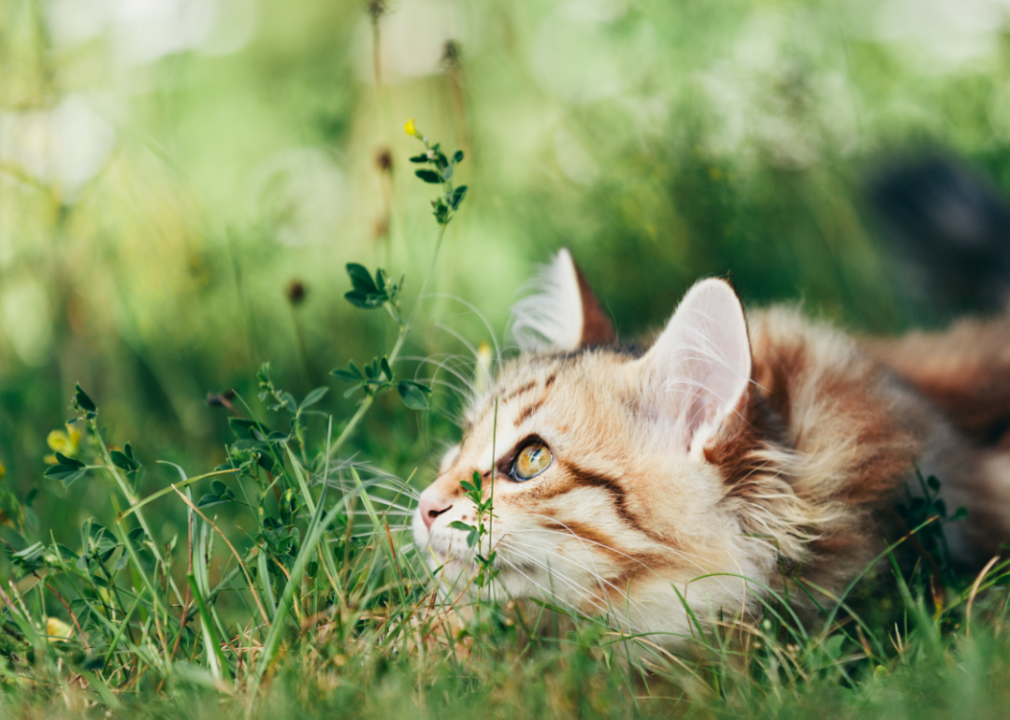
Canva
Why do cats have whiskers? And answers to 50 other kitten questions
The arrival of the internet revealed an indisputable fact about human beings and the things that pique their interests: When given instant access to the accumulated knowledge of the entire human race, people will use it mostly to look at kittens.
That’s not exactly true, actually, but it’s pretty close. The Purina company, which makes Friskies cat food, claimed in 2013 that 15% of all web traffic is cat-related—but it turns out that may be just another urban legend. Kittens and cats play a lead role in videos, vlogs, blogs, and marketing campaigns, and they’re the subjects of an endless ocean of memes and gifs. Celebrity felines like the recently deceased Grumpy Cat rack up hundreds of millions of views and earn millions of dollars for their lucky owners.
That’s because, in part, domestic cats are among the most familiar animals on Earth—the World Atlas estimates there are as many as 600 million of them pouncing and purring across the world. People keep them inside and outside, and a lot of times, entire neighborhoods “adopt” a stray that everyone feeds, but no one actually owns. They’ve been used for centuries as pest control—and for good reason. Most people who have ever owned an outside cat are all too familiar with the gory trophies they’re known to leave on front porches and stoops. Research published in the journal Nature Communications shows that cats kill as many as 3.7 billion birds every single year in the contiguous United States alone. But why do they do that?
Why do they meow? Why do they nap so much? Why do they have whiskers? Cats, and their undeniably adorable babies known as kittens, are mysterious creatures. Their larger relatives, after all, are some of the most mystical and lethal animals on the planet. Many questions related to domestic felines, however, have perfectly logical answers. Here’s a look at some of the most common questions related to kittens and cats, and the answers cat lovers are looking for.
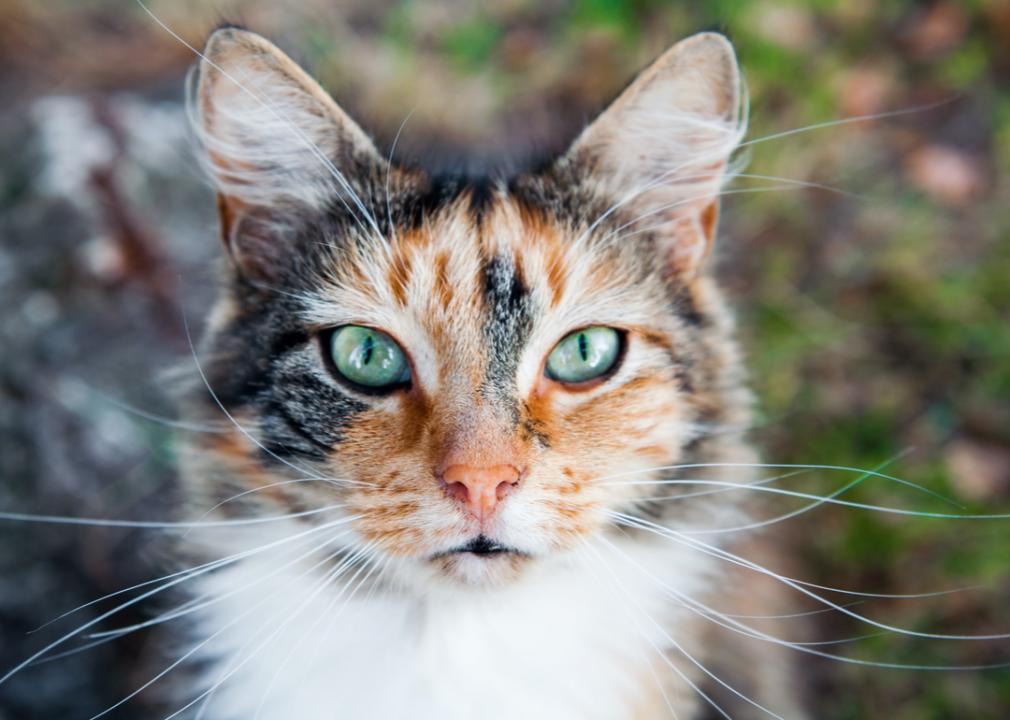
Zanna Pesnina // Shutterstock
Why do cats have whiskers?
Whiskers are sensory receptors that allow cats to avoid collisions while moving around in the dark and help them hunt in low-light environments. When the whisker touches something, the cat knows it’s there, even if it can’t see—good for cats, tough luck for mice and birds.
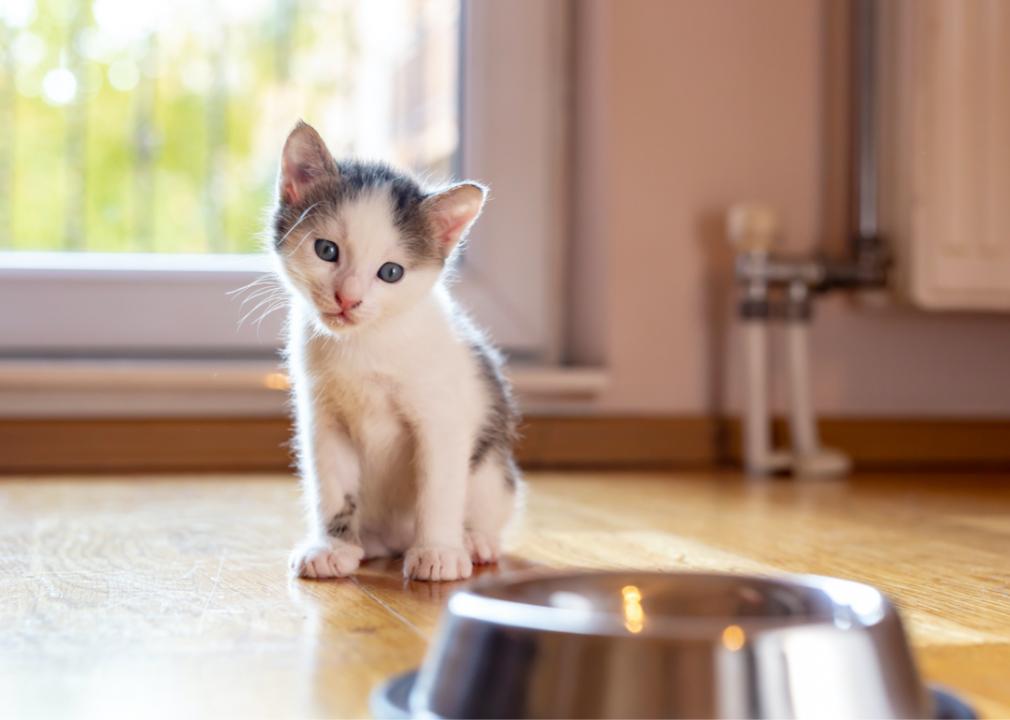
Impact Photography // Shutterstock
Should kittens drink milk?
No, the classic images of kittens eagerly lapping up bowls of milk are misleading. Cow’s milk causes upset stomachs and diarrhea in kittens because they are lactose intolerant, but is usually fine in small amounts for older cats that can tolerate lactose better than their babies. There is no need, however, for cats to drink milk at all after they wean, particularly milk from a different species.
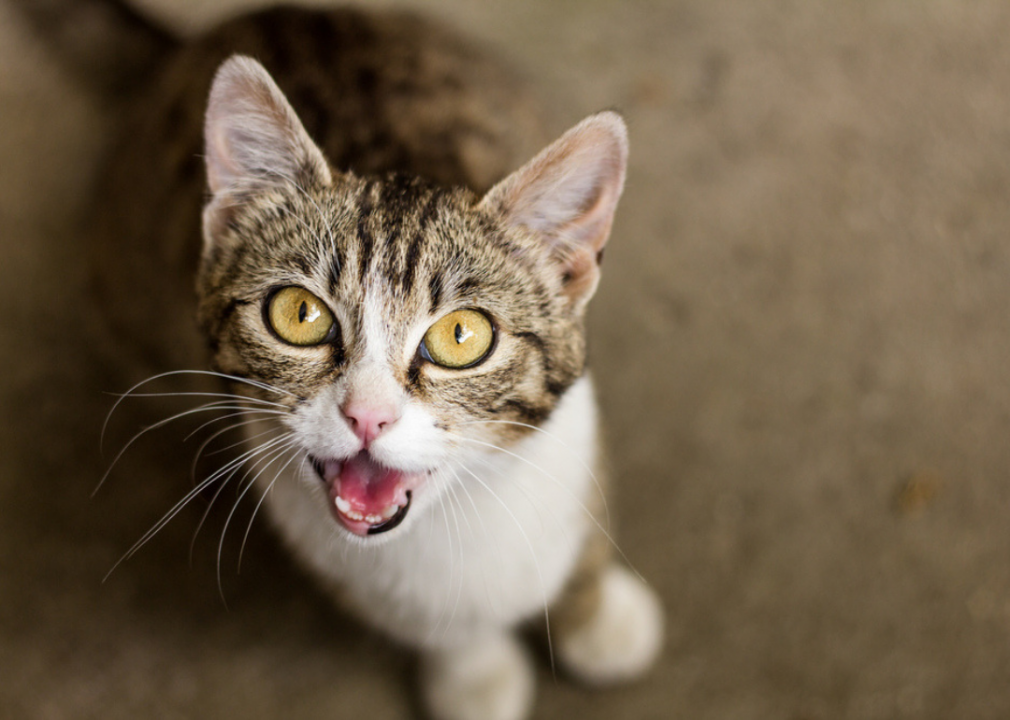
Marko Radenkovic // Shutterstock
Why do kittens meow?
Kittens meow to communicate with their owners, each other, and mama cats. In most cases, it’s their way of asking for companionship or, more likely, food.
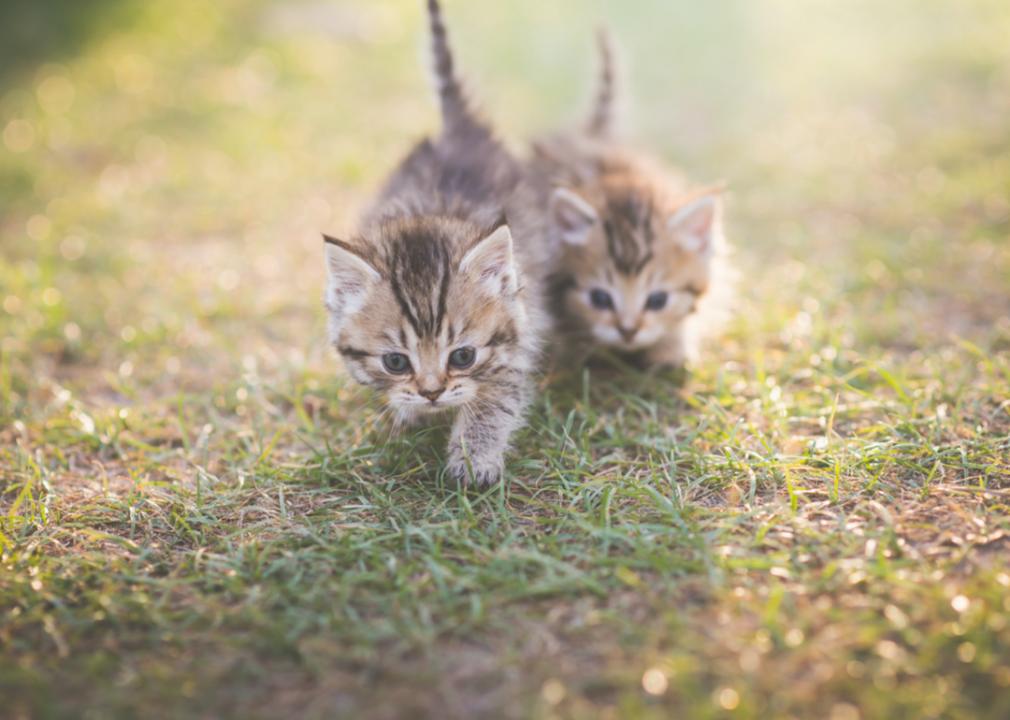
ANURAK PONGPATIMET // Shutterstock
Should I make my kitten an outside cat?
In an interview with Country Living, a veterinarian said, “Asking a vet if your cat should be kept inside is like asking a dentist if you should brush your teeth.” Outside cats are much more likely to suffer an injury or illness than their inside counterparts, which live nine years longer, on average, than outside cats.
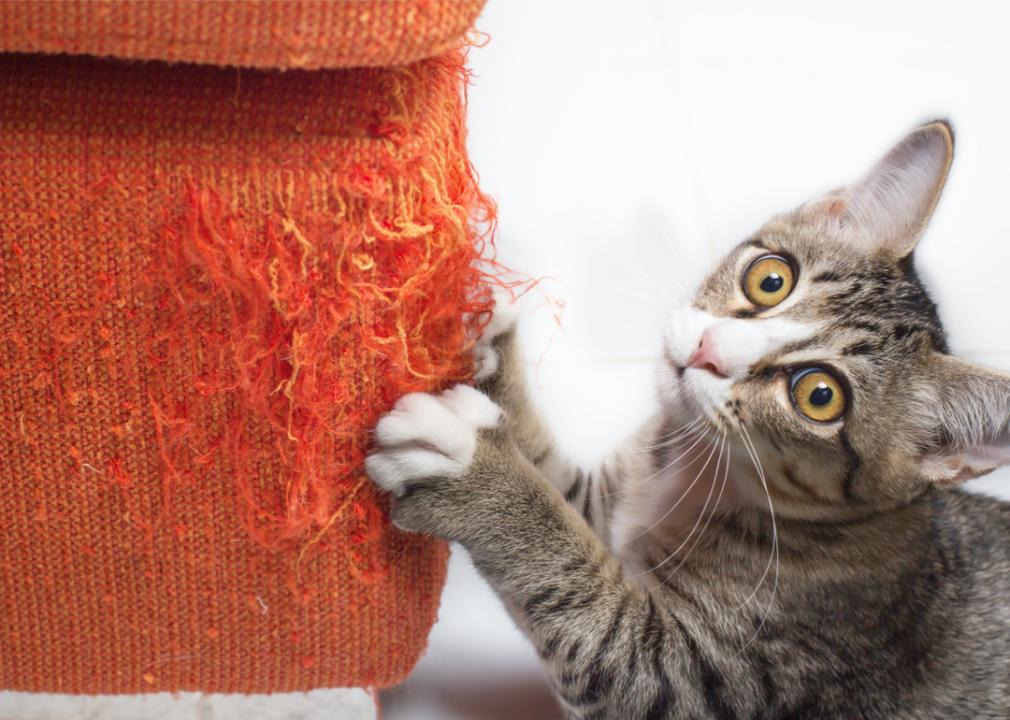
noreefly // Shutterstock
Why do cats love clawing couches?
Like the act of meowing, claw-based furniture annihilation is a form of communication. Cats scratch and claw high-traffic areas to let the world know that they’ve claimed that area as their territory.
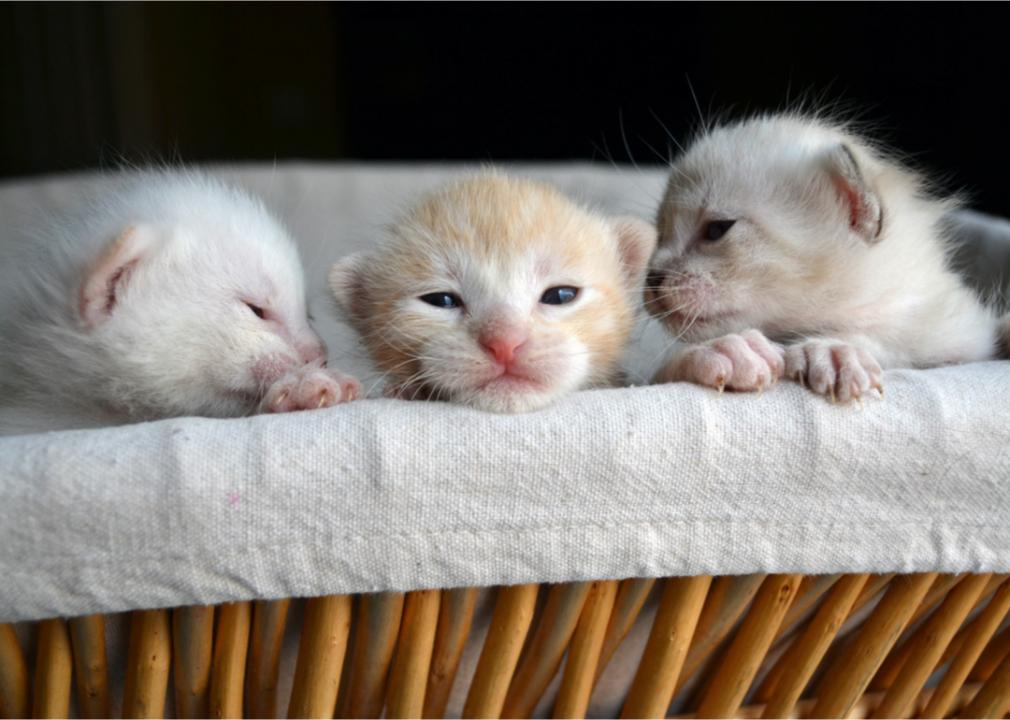
MW47 // Shutterstock
Will my kitten’s eyes always be blue?
Probably not. Kittens first open their eyes a week or two after birth, and when they do, they usually reveal a dusty blue color. The baby blues, however, are fleeting, and tend to transform to the cat’s permanent eye color a month or two later.
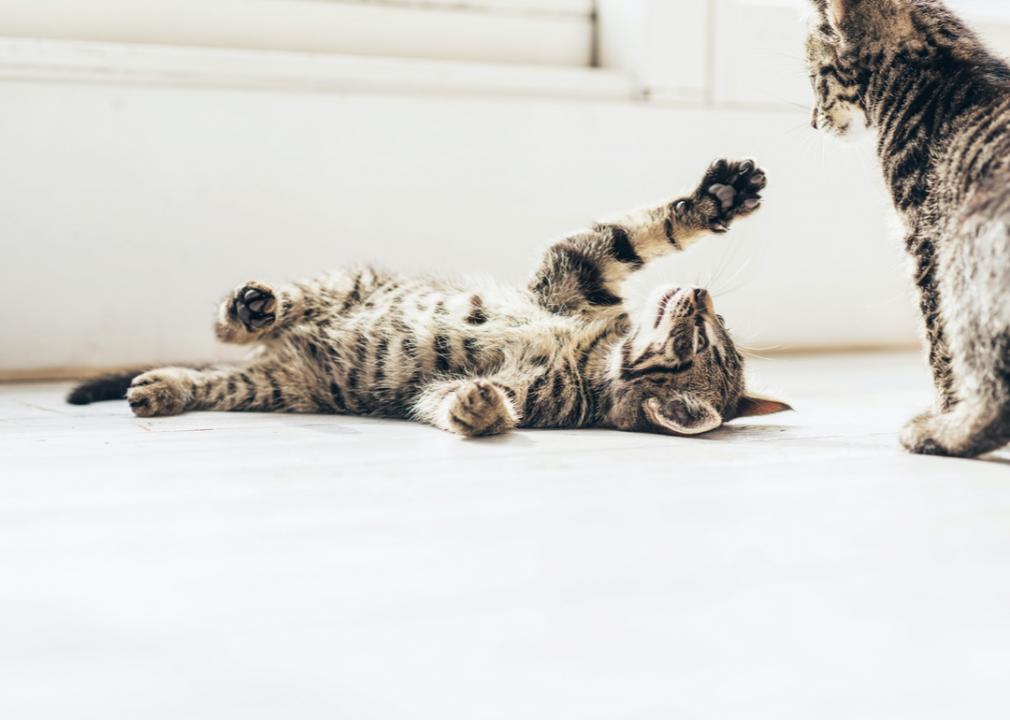
Ysbrand Cosijn // Shutterstock
Should I get my kitten microchipped?
Cats need permanent identification even more than other common pets. Compared to dogs, for example, they’re more likely to slip their collars. They’re also frequently chased by dogs and other animals, and they’re known for trying to return to their former homes, which can be an issue for adopted rescue cats.

Zhuravlev Andrey // Shutterstock
Why is my cat suddenly not using the litter box?
Probably because he or she is suffering from a urinary tract infection, a common ailment in older cats. If a cat is under the age of 8, however, it’s likely a condition called feline lower urinary tract disease. Either way, the owners should not make the common mistake of assuming the cat is trying to spite them, but instead, take it to the vet.
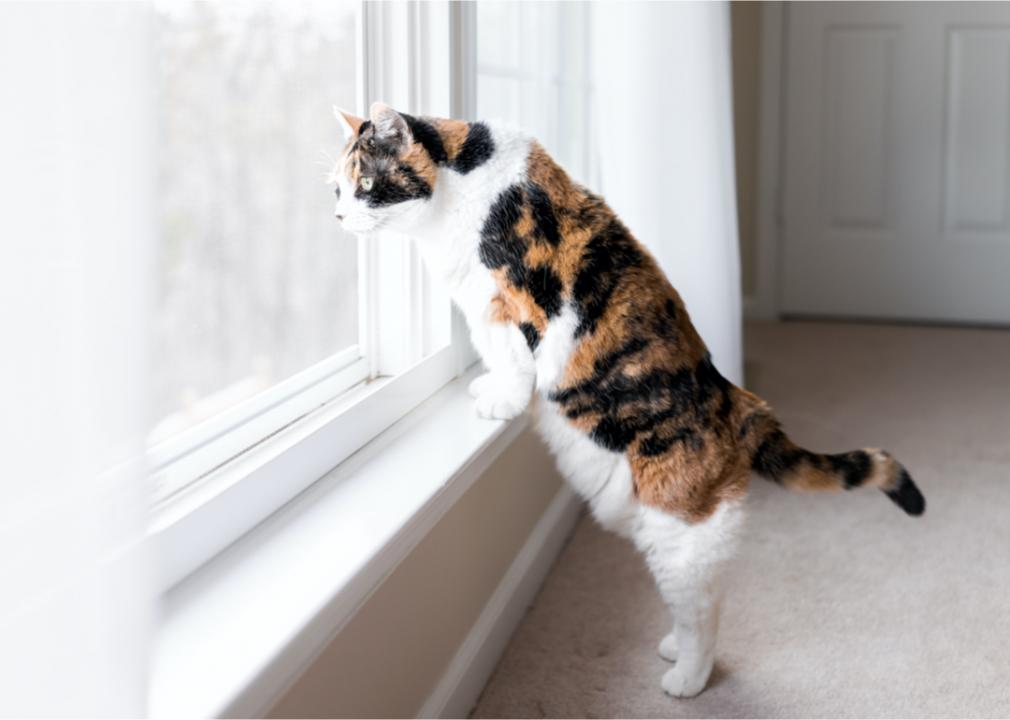
Kristi Blokhin // Shutterstock
Why does my cat ‘chirp’ when looking out the window
Many experts believe that cats make chirping sounds in an attempt at “avian mimicry.” That is, they’re likely trying to call, or at least distract, birds they plan to attack.
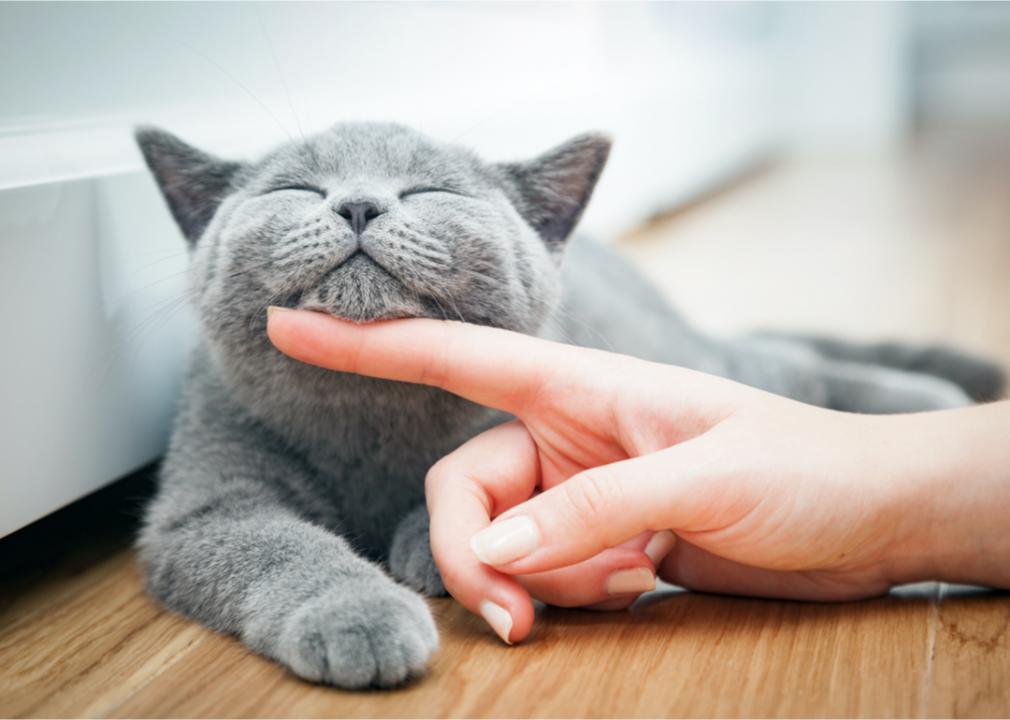
HOTOCREO Michal Bednarek // Shutterstock
Why do cats purr?
The unmistakable sound of purring is unique to cats, and all but the largest felines—like lions and tigers—engage in this specialized vocal behavior. Experts believe that purring, which runs through the entire respiratory cycle of both the inhale and exhale, is the cat’s way of letting people and other cats know that it approves of their behavior and to keep doing whatever it is they’re doing. Food and petting, after all, are the surest ways to turn on the switch.
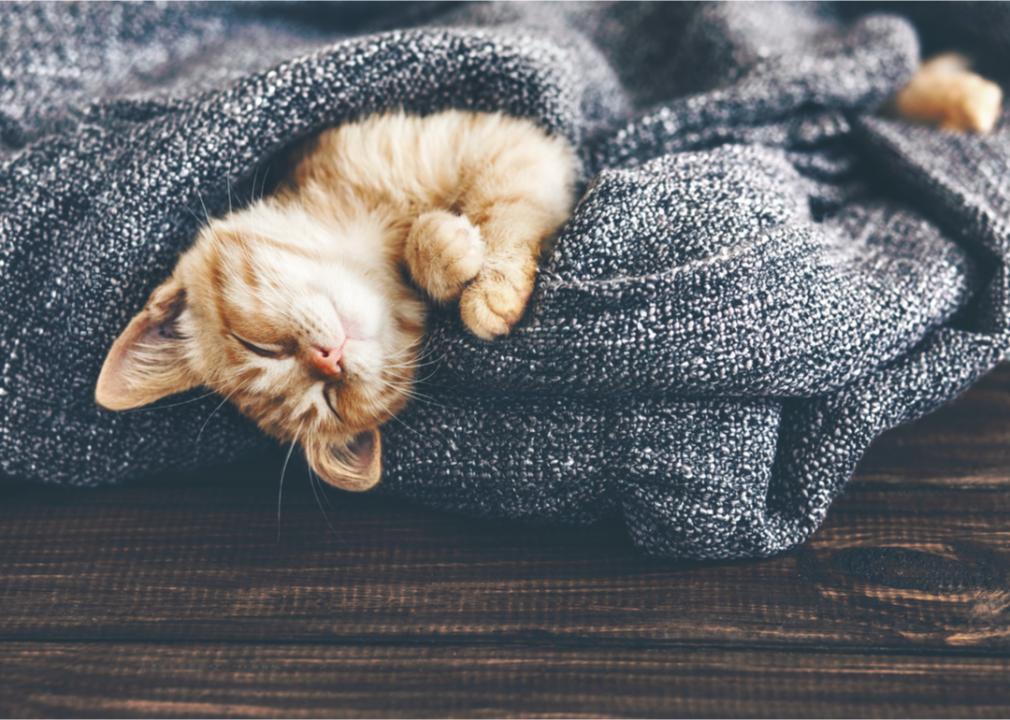
Alena Ozerova // Shutterstock
What’s up with my cat’s super-long cat naps?
Cats are most active at dawn and dusk, their natural hunting times—but they spend a lot of the rest of the day asleep. In fact, cats sleep for nearly 10 hours a day and rest for more than five hours beyond that.
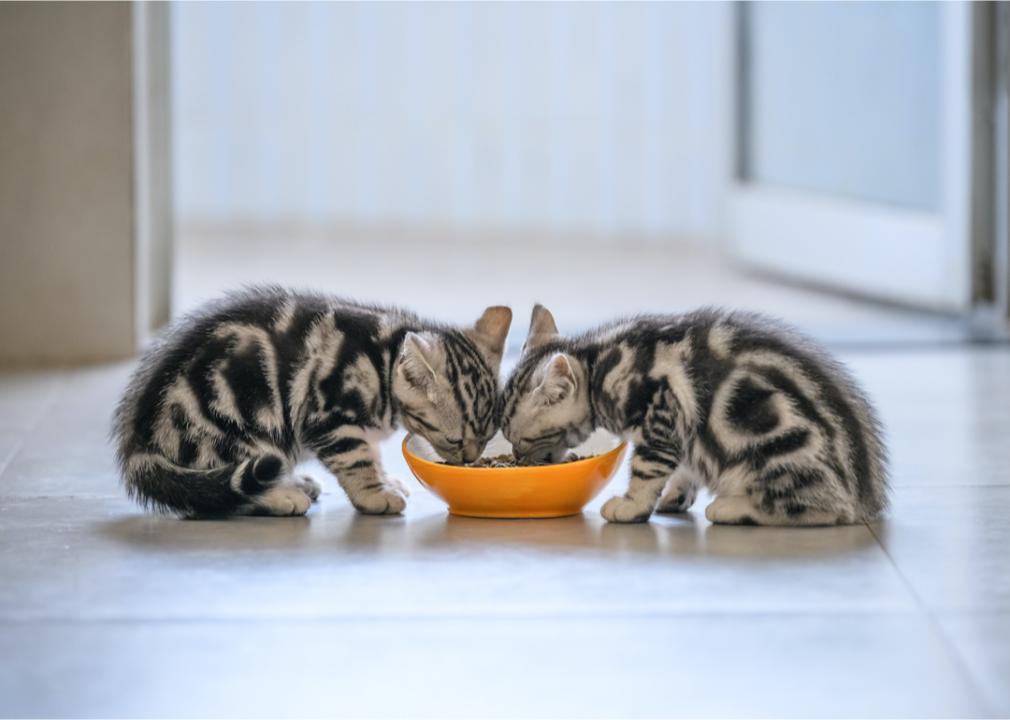
Chendongshan // Shutterstock
When are kittens old enough to eat solid food?
About four or five weeks after birth, mother cats will start leaving their kittens alone for longer and longer periods of time. When this happens, the cat is just about ready to dig into some cat food.
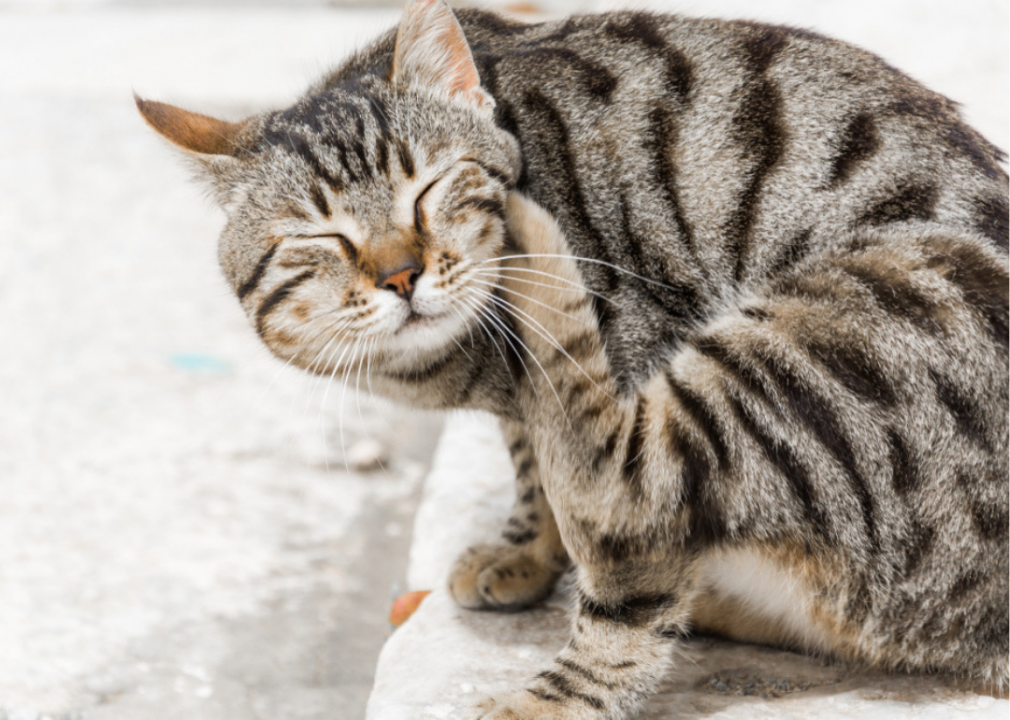
Thrithot // Shutterstock
Why is my cat always scratching its ears?
There’s nothing abnormal about occasional or even fairly regular ear scratching. If it seems excessive or obsessive, however, it might be a condition called otitis externa. This inflammation of the outer ear canal requires a trip to the vet.
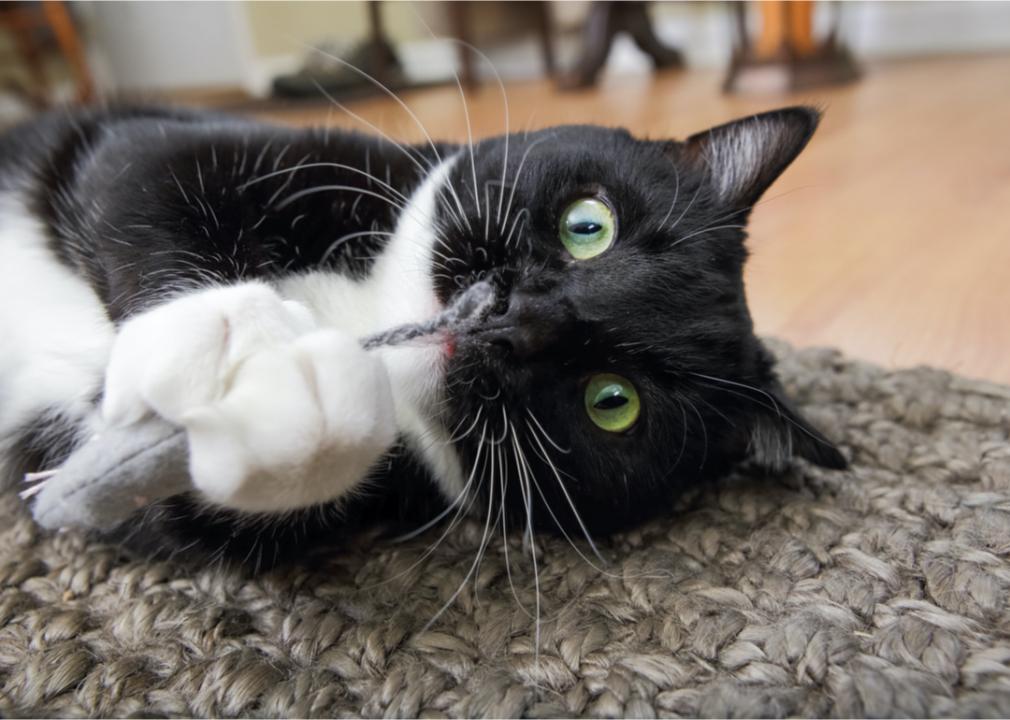
Suzanne Tucker // Shutterstock
Does catnip really make cats go crazy?
There is no doubt that some cats go into a state of excitement that resembles intoxication when exposed to catnip and catmint. For others, however, there is no reaction at all. In fact, catnip seems to have no effect on about half of all cats, but researchers don’t know why.
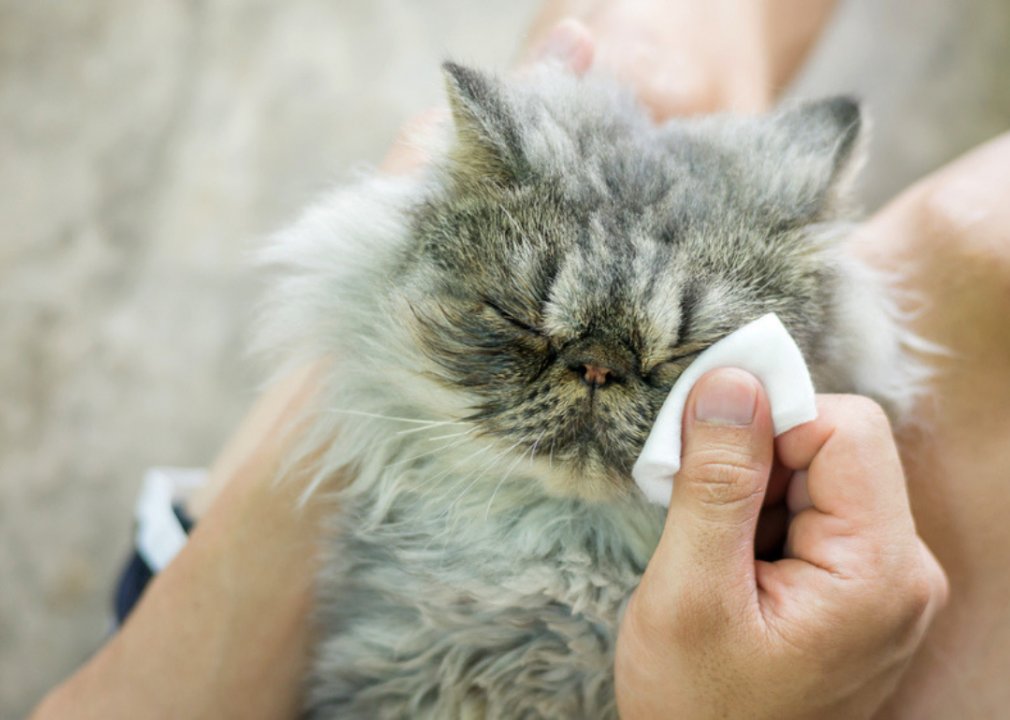
Supaleka_P // Shutterstock
Why are my cat’s eyes so watery all the sudden?
Respiratory diseases, usually a virus, are often to blame for excessively watery eyes, particularly in kittens. The feline herpes virus is another common culprit. There aren’t a lot of useful antiviral therapies, and the cat’s immune system should eventually win the day, but go to a vet immediately if the eyes ooze any kind of colored discharge.

ddisq // Shutterstock
Can I walk a cat on a leash?
Absolutely. Vets recommend it, in fact, as a healthy way to get cats outdoors without subjecting them to the dangers of cars, dogs, or simply running off.
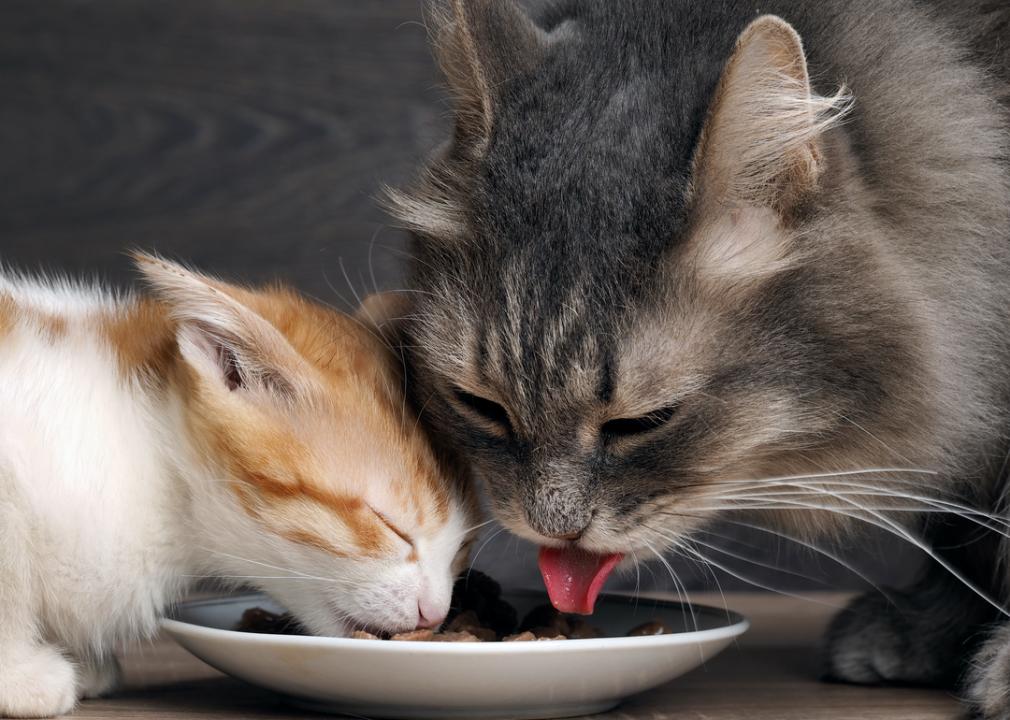
Irina Kozorog // Shutterstock
How long do cats live?
New cat owners can rest assured that their brand new kitten should be with them for quite some time. According to CatHealth.com, the lifespan of the average spayed or neutered indoor cat is 14 to 16 years. The world-record holder, however, lived for 38 years and three days. If someone gets a cat, they also get a long-term commitment.
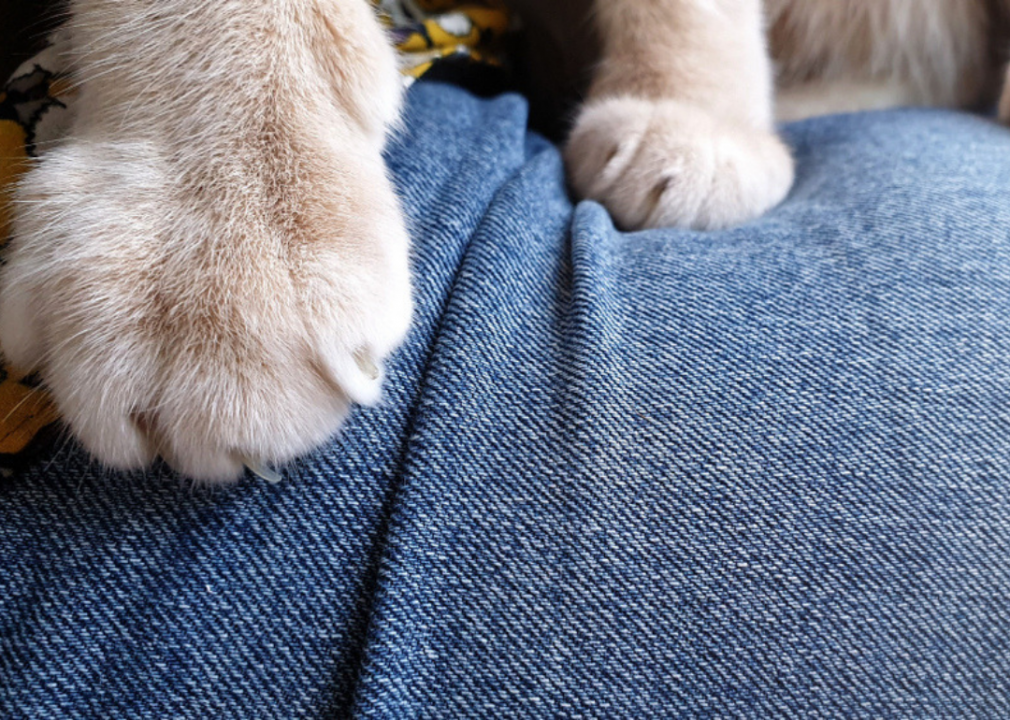
RJ22 // Shutterstock
Why does my cat knead like a baker?
Kneading is a kitten instinct that some cats retain for their entire lives. As newborns, kittens knead their mothers’ bodies to stimulate milk production.
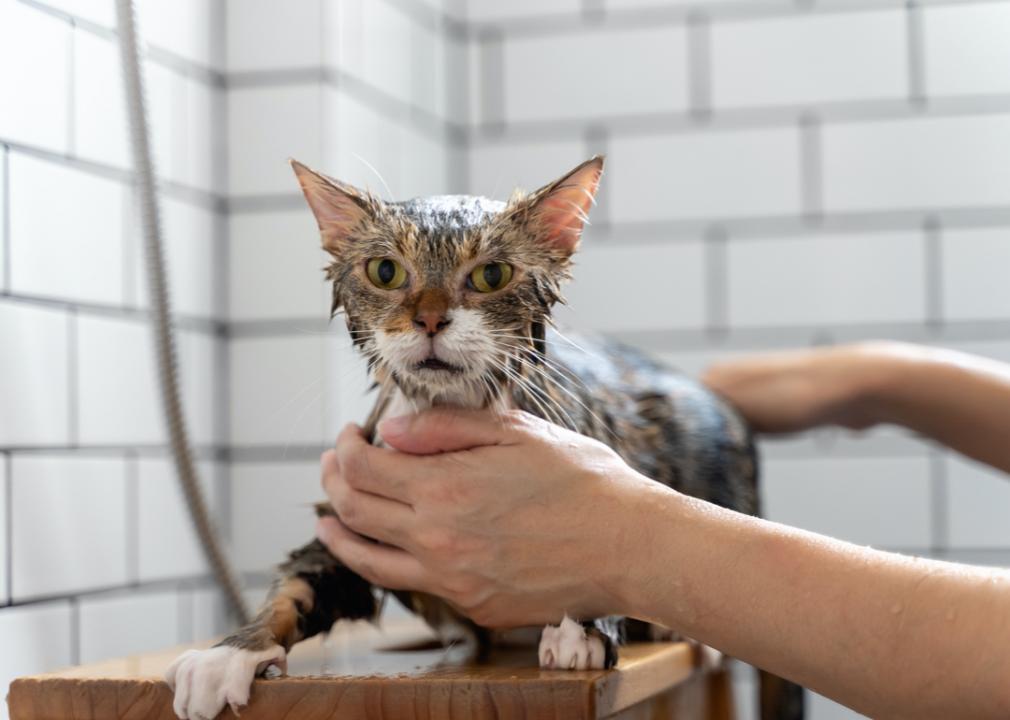
Cat Box // Shutterstock
Should I bathe my cat?
Some big cats enjoy the water and are proficient swimmers—the common house cat, however, is not. Since cats are perpetual self-groomers, they almost never need to be bathed unless the circumstances are extraordinary, like a cat covered in mud.
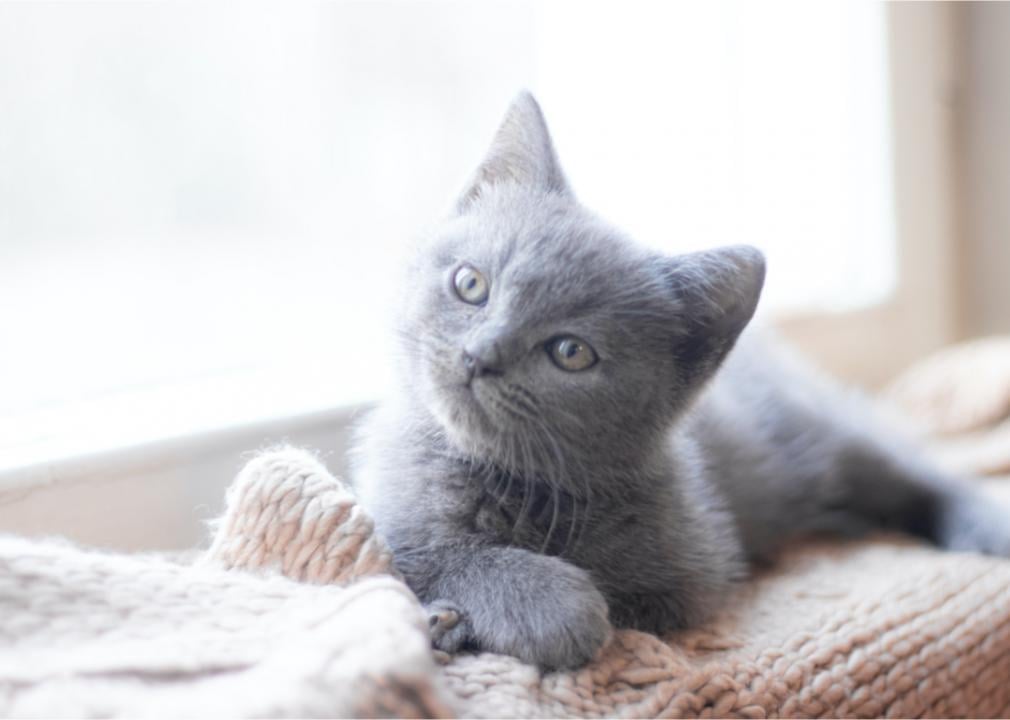
alenka2194 // Shutterstock
What vaccinations do kittens need?
So-called “core” vaccinations are the shots that all kittens have to get. Rabies is one of them, and the others are feline panleukopenia (FVRCP), feline rhinotracheitis, and feline calicivirus. The vaccination schedule can start as early as six weeks old.
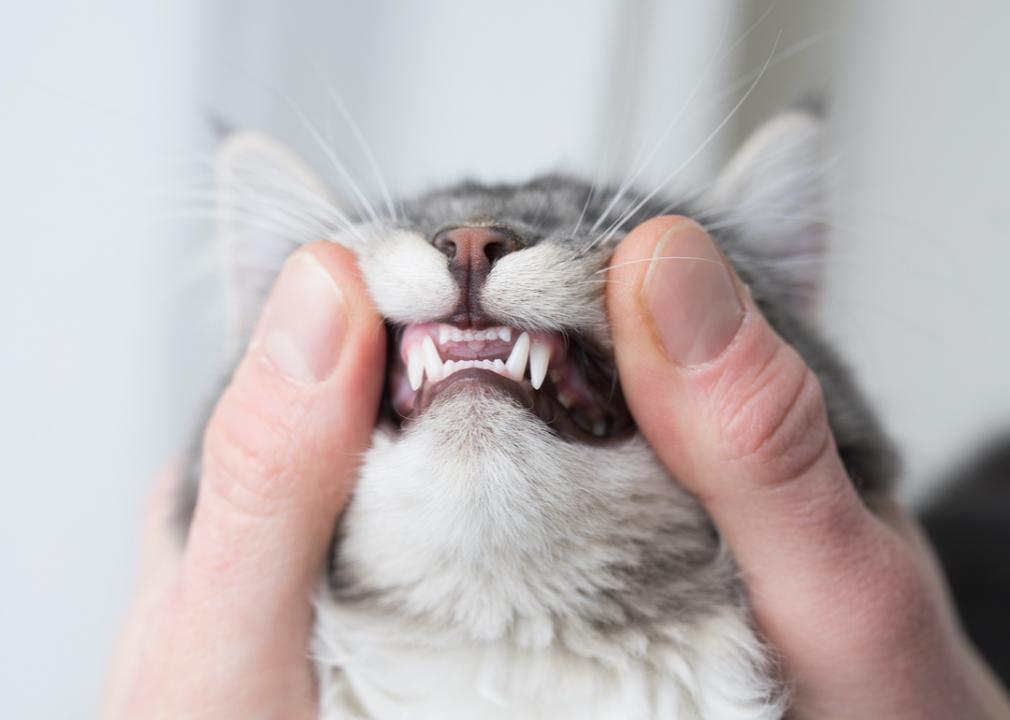
Nils Jacobi // Shutterstock
Do kittens’ teeth fall out?
Cats go through a similar coming-of-age ordeal as human kids. They’re born without teeth, then they get 26 baby teeth—also called milk teeth or deciduous teeth—starting around two weeks old. By the time kittenhood ends, however, they all fall out and are replaced by 30 permanent teeth.
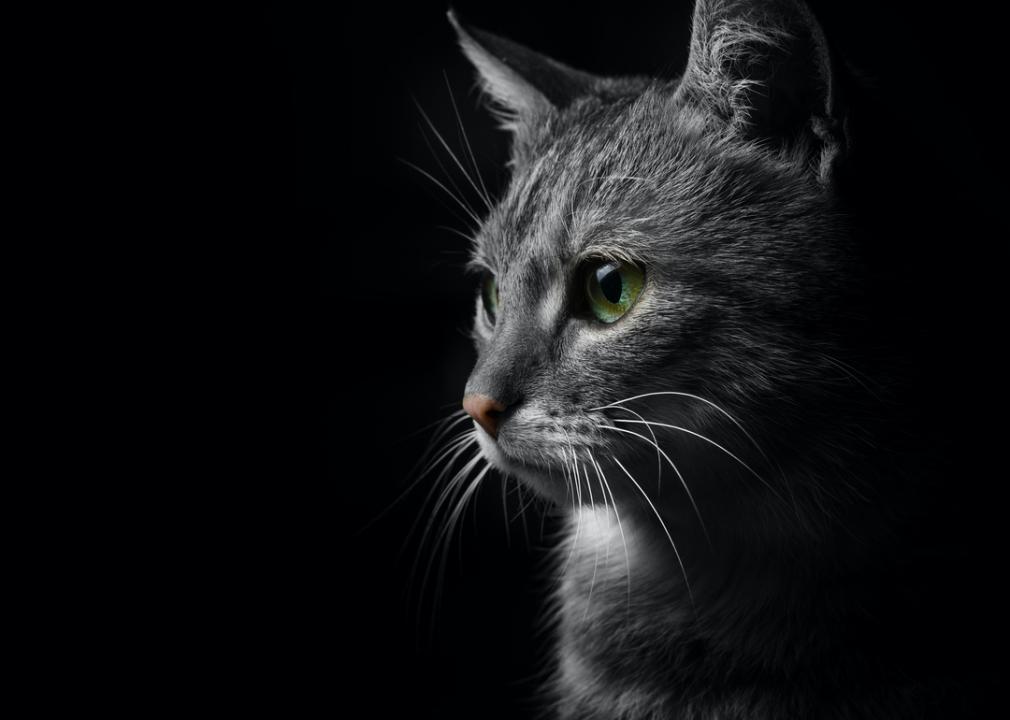
gornostay // Shutterstock
Why does my cat scream at night?
It’s common for many older cats (those over the age of 8) to howl and scream at night. The reason will not be the same for every cat in every case, but the most common causes are age-related pain and nighttime anxiety, both of which are known to cause nocturnal howling.
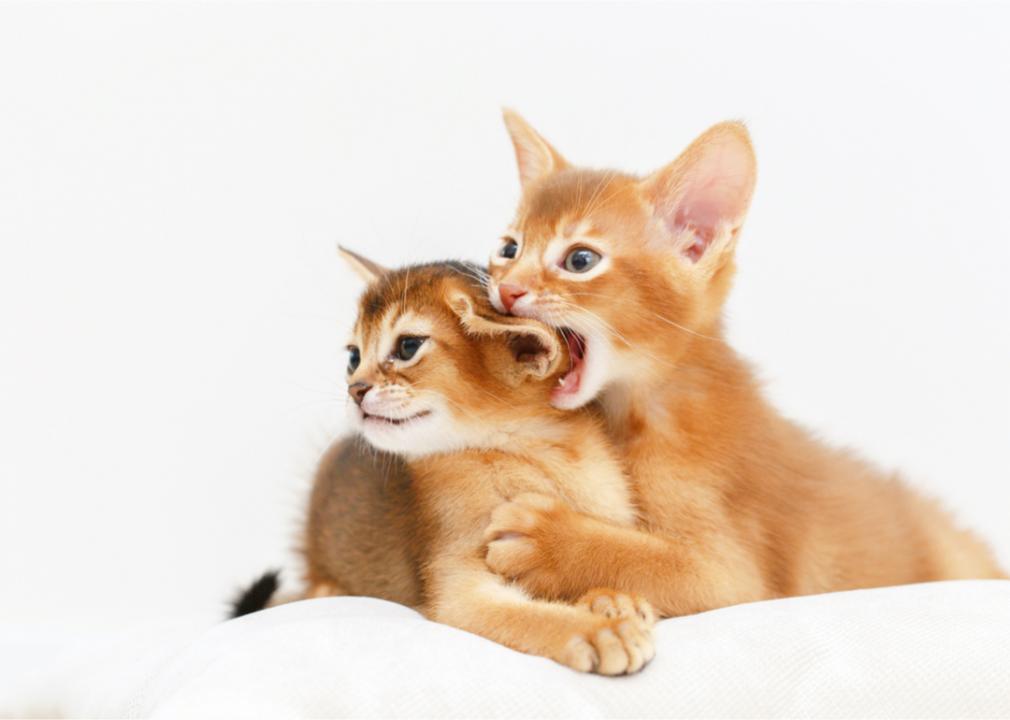
Osetrik // Shutterstock
Why did my cat grow a big bump?
It’s natural for cat owners to panic and assume the worst when they notice a lump on the body of their beloved, but chances are good that it’s something fairly manageable. When cats play rough with each other they sometimes nip and bite. In doing so, their saliva can get into even the smallest puncture wounds, get infected, and cause an abscess.
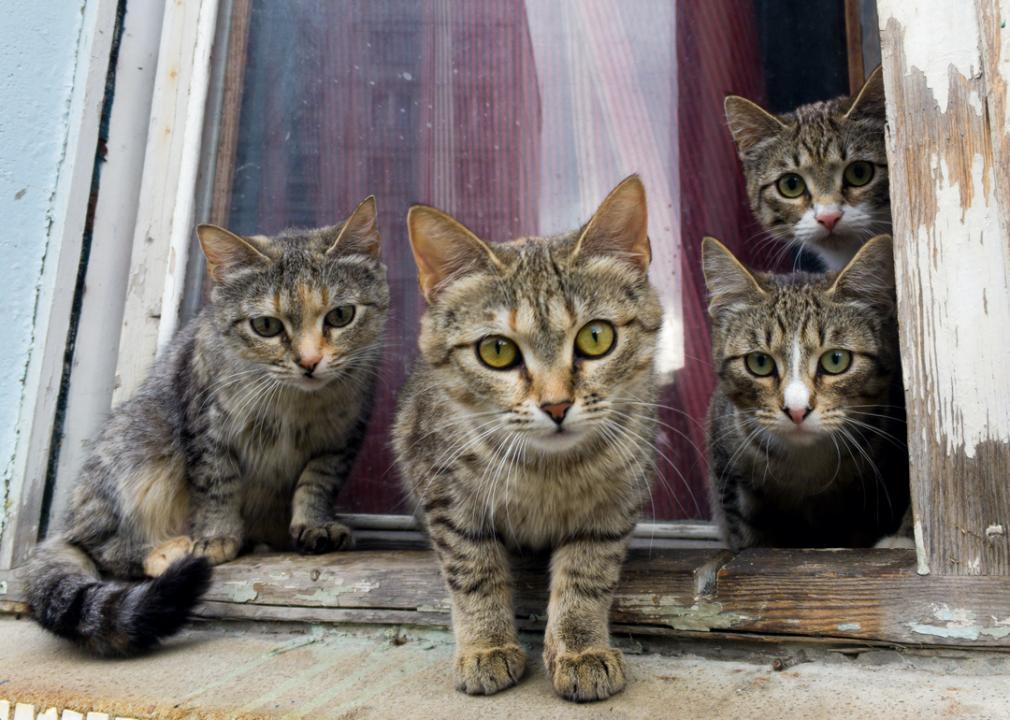
VPales // Shutterstock
What do you call a group of cats?
Fish move in schools, geese group up into gaggles, and camels live in caravans. A group of cats, on the other hand, is called a “clowder”—which means “to huddle” in Middle English—or sometimes a “glaring.”
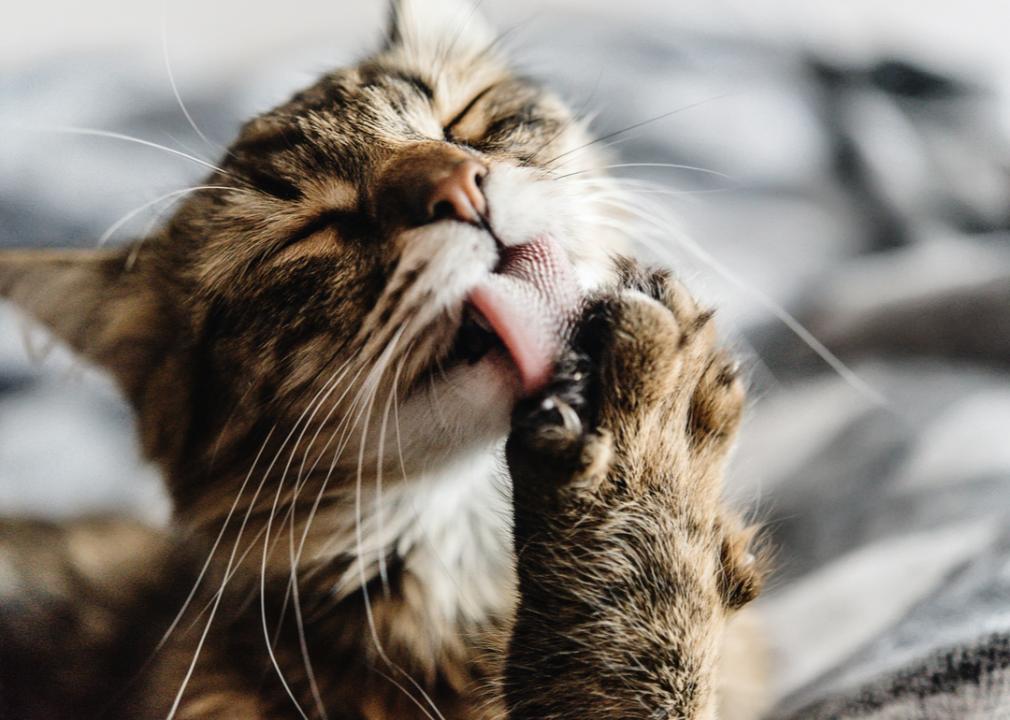
Bogdan Sonjachnyj // Shutterstock
Why do cats have scratchy tongues?
Unlike their canine counterparts, cats have rough, scratchy tongues that feel like wet, high-grit sandpaper on the skin. That’s because of tiny spines called filiform papillae, which cats use to scrape meat morsels from bones and, more importantly, to groom their fur. Since cats are predators that often double as prey in the wild, grooming is incredibly important for cats to reduce their scent to conceal themselves both from what they’re hunting and what’s hunting them.
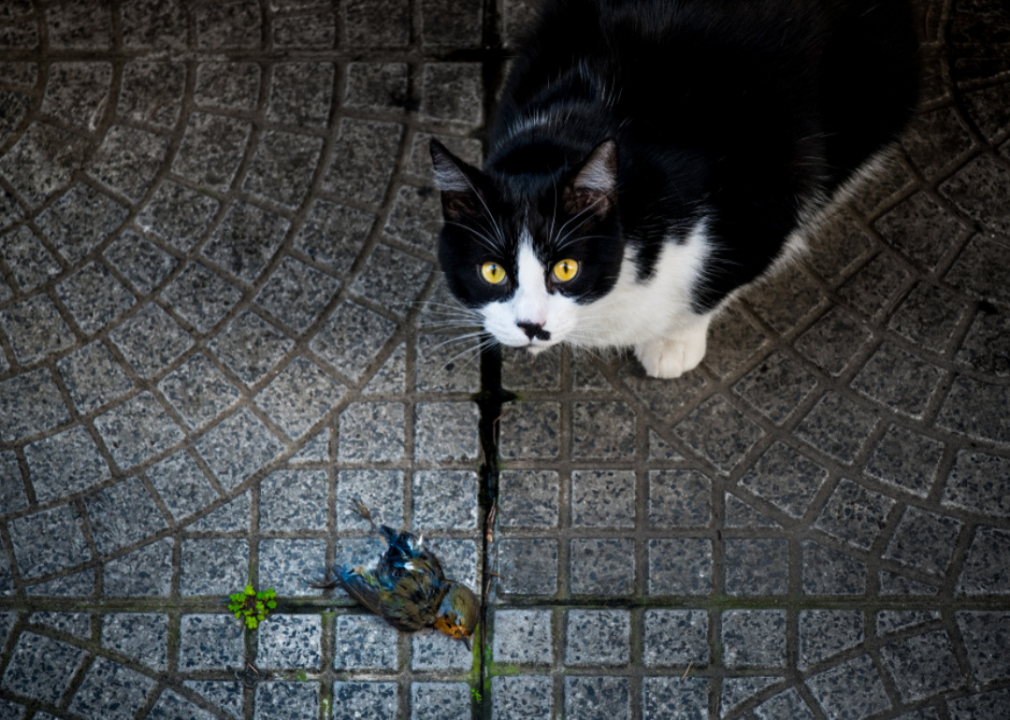
Fabio Pagani // Shutterstock
Why do cats leave dead animals on the doorstep?
Cats are predators and natural hunters, but kittens must be taught how to stalk and kill. Wild cats often injure animals and carry them back so their kittens can practice killing, or they might simply kill something all the way and bring it back for the cat family to eat. Either way, domesticated cats adopt their owners as their surrogate families, so the recurring gift of mangled rodent and bird carcasses becomes theirs.

Mi Ha // Shutterstock
How can I help my chubby cat slim down?
Like humans, overweight cats are far more prone to serious health problems like diabetes, and also like humans, bad diet and a sedentary lifestyle are usually to blame. Common commercial cat foods often contain a lot of grain filler. If a cat is gaining too much weight, the solution might be found in alternative foods that have higher protein-to-carb ratios.
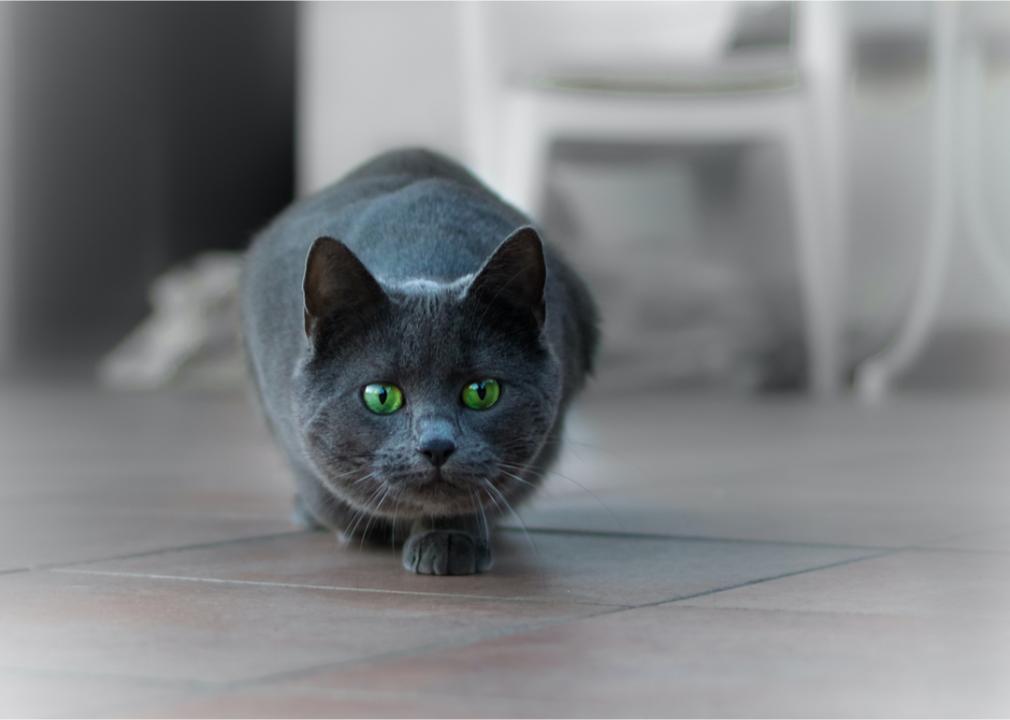
Jana Raue // Shutterstock
Just how efficient are cats as hunters?
It’s hard to imagine that, besides humans, another species is responsible for more wholesale death than cats. They are believed to kill up to 3.7 billion birds and as many as 20.7 billion mammals—mostly rabbits, mice, shrews, and voles—in just the 48 contiguous United States alone. No other species is believed to kill more birds and mammals in America.
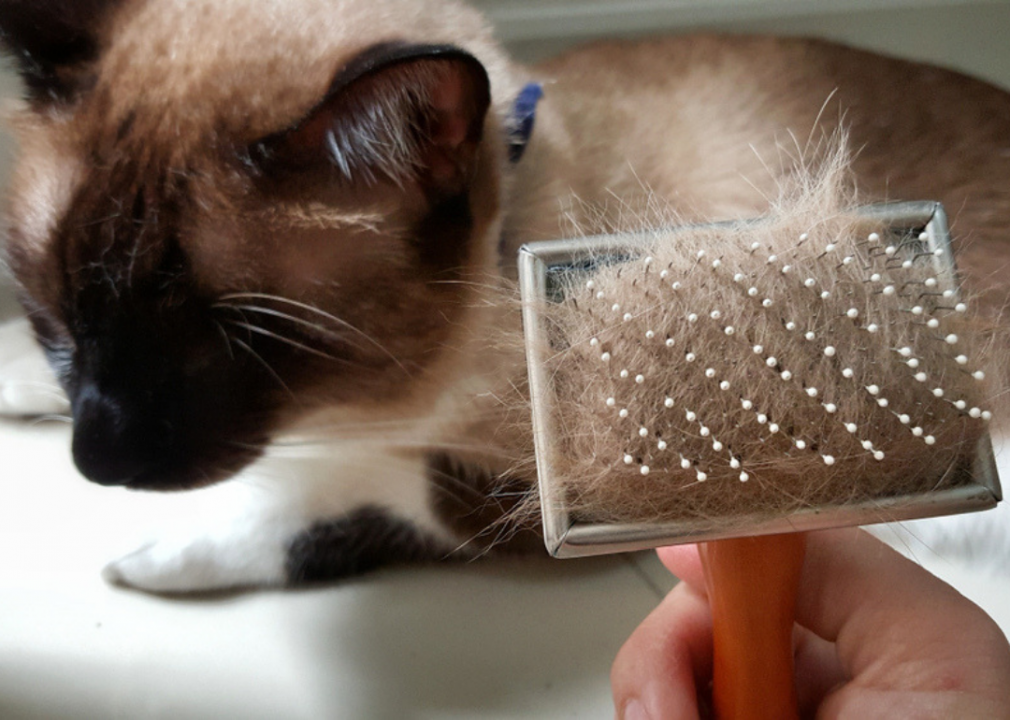
RJ22 // Shutterstock
What am I going to do about all this cat hair?
Most cats shed—and some of them shed so much that their adopted families can’t vacuum enough to keep up with it all. The single biggest weapon in the war against excessive cat hair is frequent brushing. In severe cases, brushing should become a daily ritual.

Andrea Izzotti // Shutterstock
When were cats domesticated?
The domestication of wild cats can be traced to 10,000 years ago—right around the same time that human beings adopted agriculture. Researchers traced the DNA of the common house cat to Felis silvestris lybica, an ancient wildcat that still lives in the Middle East, right around the place where people first became farmers.
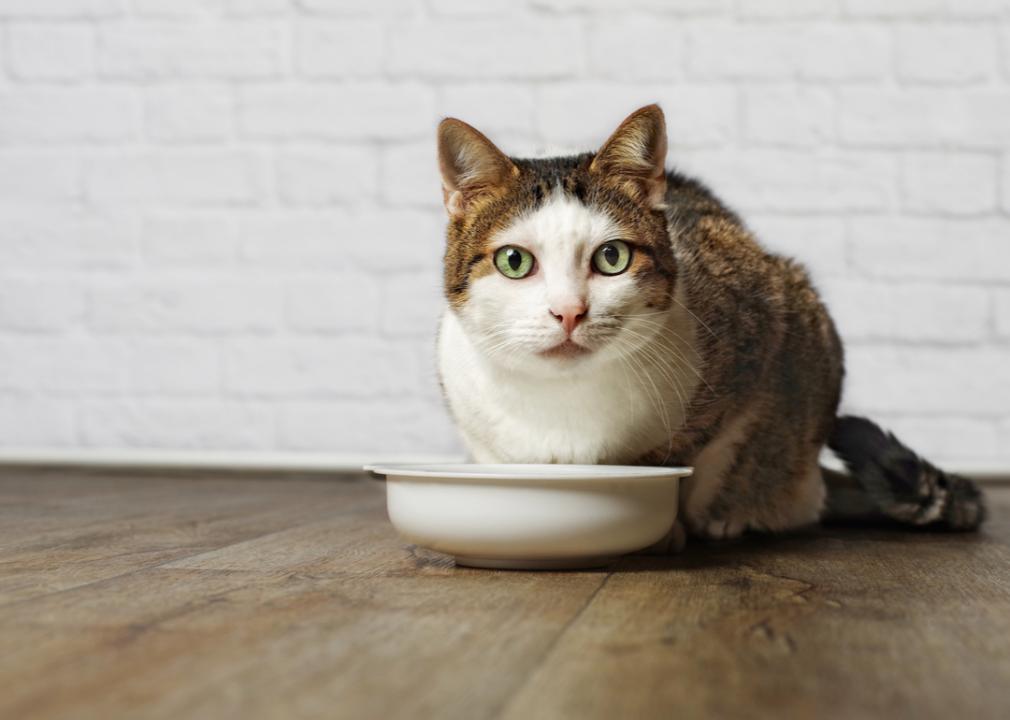
Lightspruch // Shutterstock
Can cats be vegetarians?
Unlike dogs, people, and other omnivores, cats are true, or “obligate” carnivores that have to eat meat to satisfy their high protein requirements and to obtain the nutrients they need to be healthy. That said, the meat found in a great deal of commercial cat food doesn’t resemble anything approaching a cat’s natural diet of wild birds and small mammals, and some companies sell enriched vegetarian cat food that many cat owners swear by. The concept of the vegetarian cat, however, remains controversial and examples are the exception, not the rule.
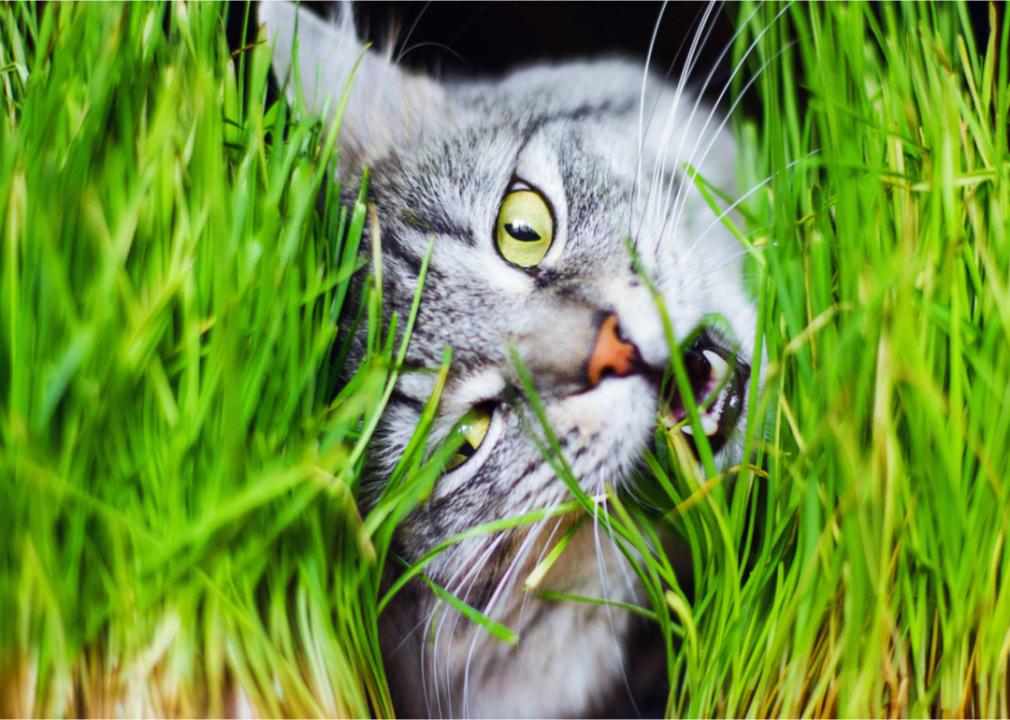
KDdesignphoto // Shutterstock
Why does my cat eat grass?
Although they’re carnivores by nature, cats often eat grass and other roughage. This is likely to soothe digestive problems or to help the cat purge after eating spoiled food or something else it no longer wants in its belly. Cats are almost certainly not eating grass for nutritional value or to satiate hunger.

DreamBig // Shutterstock
What’s the most popular breed of cat?
In terms of pedigree cats, the Persian certainly wins the award for most popular in North America, and perhaps the whole world. Thanks to its remarkable face and glamorous, flowing coat—which comes in colors other than just white, contrary to popular belief—no breed is in higher demand than the high-maintenance, but undeniably handsome Persian cat, whose popularity dates back to the Victorian era.
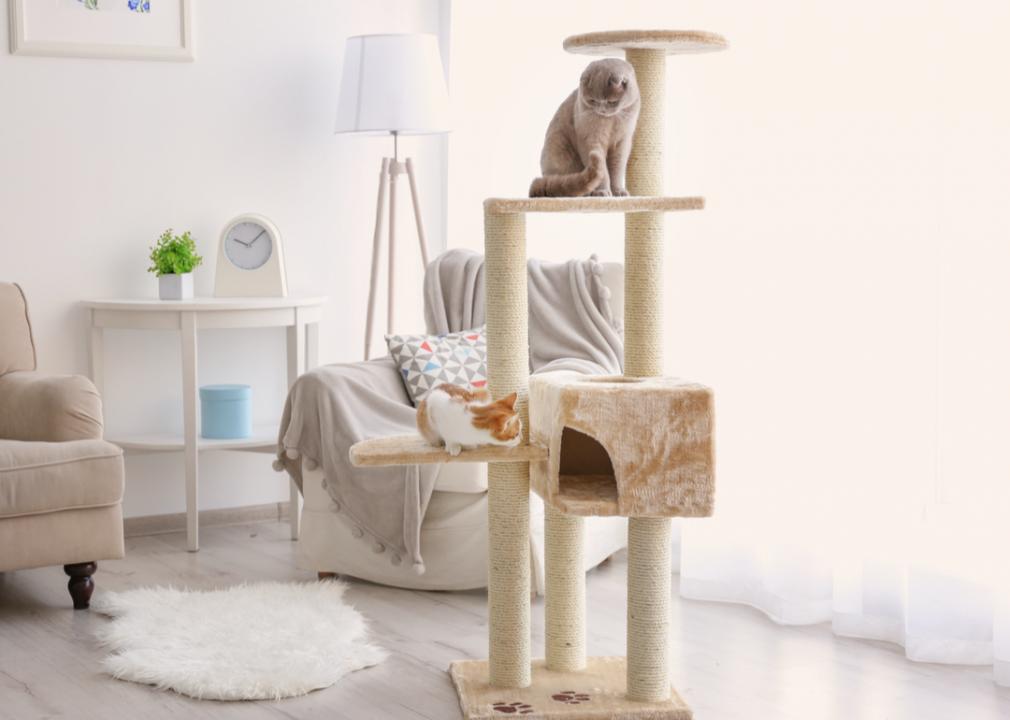
Africa Studio // Shutterstock
So, how many people own cats, anyway?
More than 34% of American households—over 42 million households in total—own a cat, according to 2020 data from the American Pet Products Association. More than three-quarters are mixed-breed, aka “mutt,” felines.
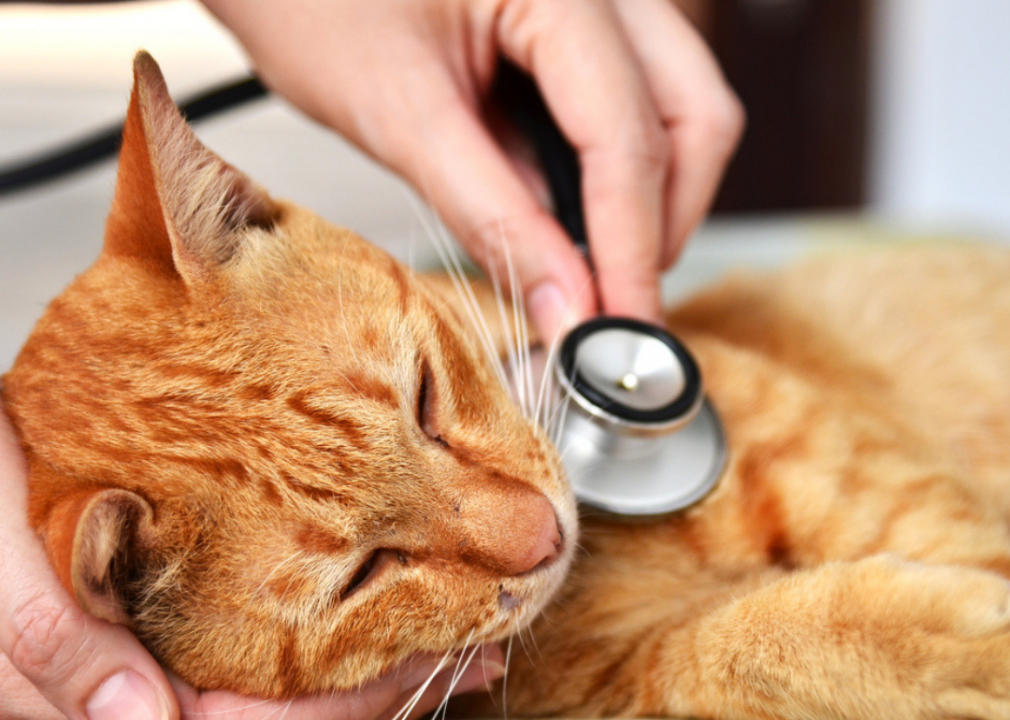
JJ IMAGE // Shutterstock
Should I worry about feline leukemia?
Feline leukemia is a big killer of cats. The disease is spread through saliva during cat-to-cat contact. Every cat should be vaccinated, however, even if its owner doesn’t expect it to ever come into contact with others of its kind.
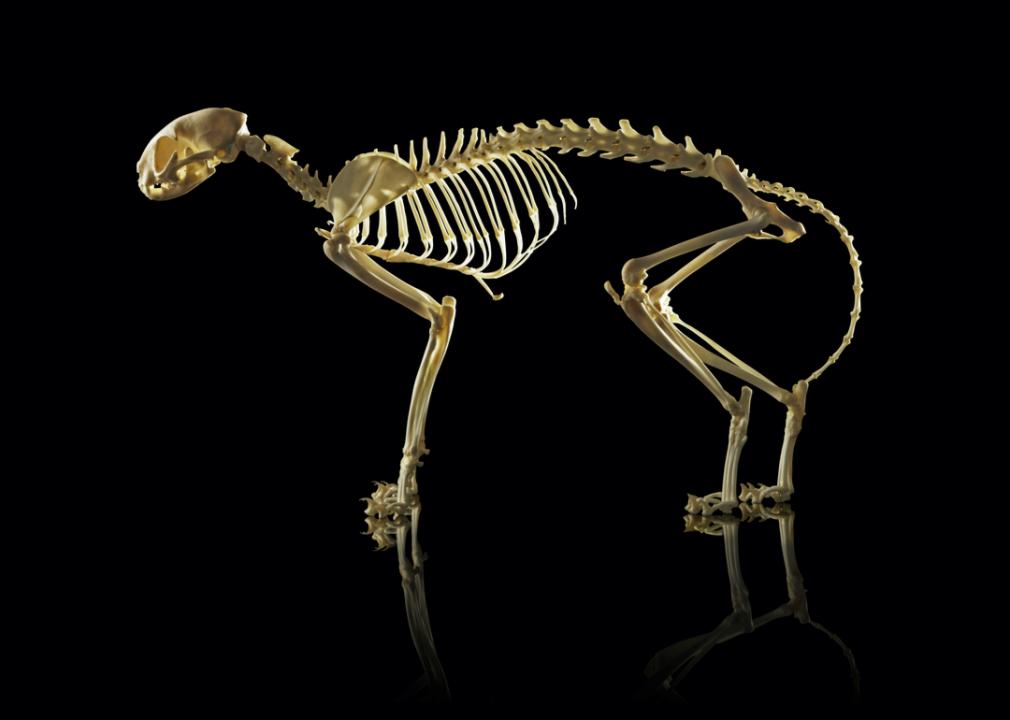
Stock Up // Shutterstock
How many bones are in a cat’s body?
The human body has 206 bones, but with cats, counting isn’t that simple. According to Colorado State University, cats have between 230 to 250 bones, depending on the individual and the breed. The average cat has 244 bones.
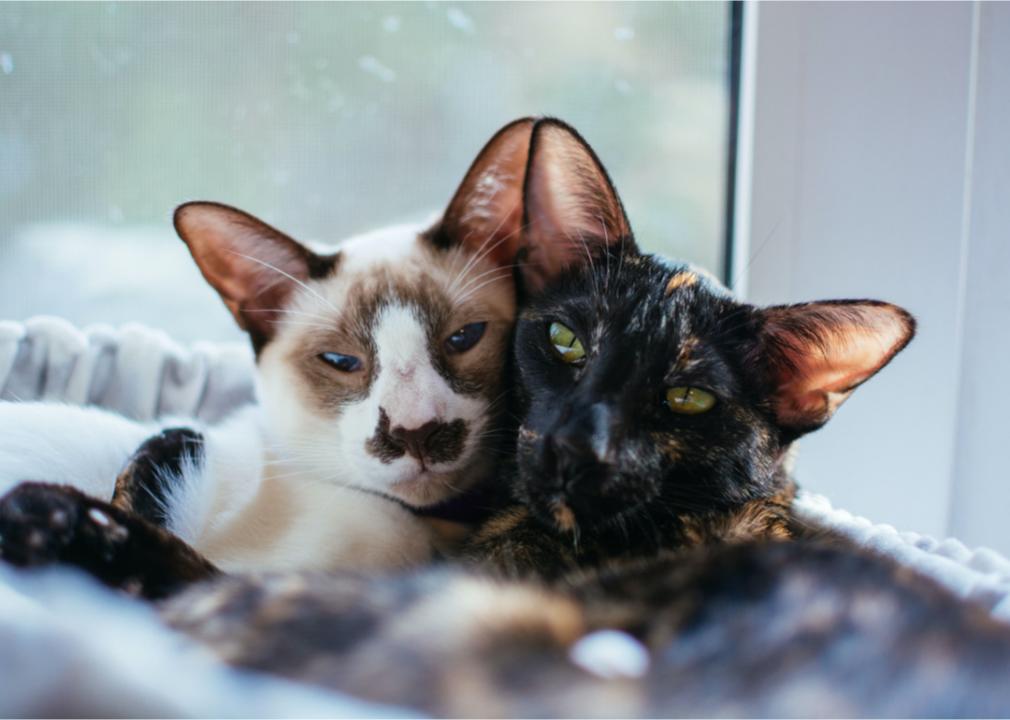
alisinica // Shutterstock
How about muscles?
Cats’ bodies are comprised of 517 muscles. A full 32 of those muscles—more than 16%—are in their ears.
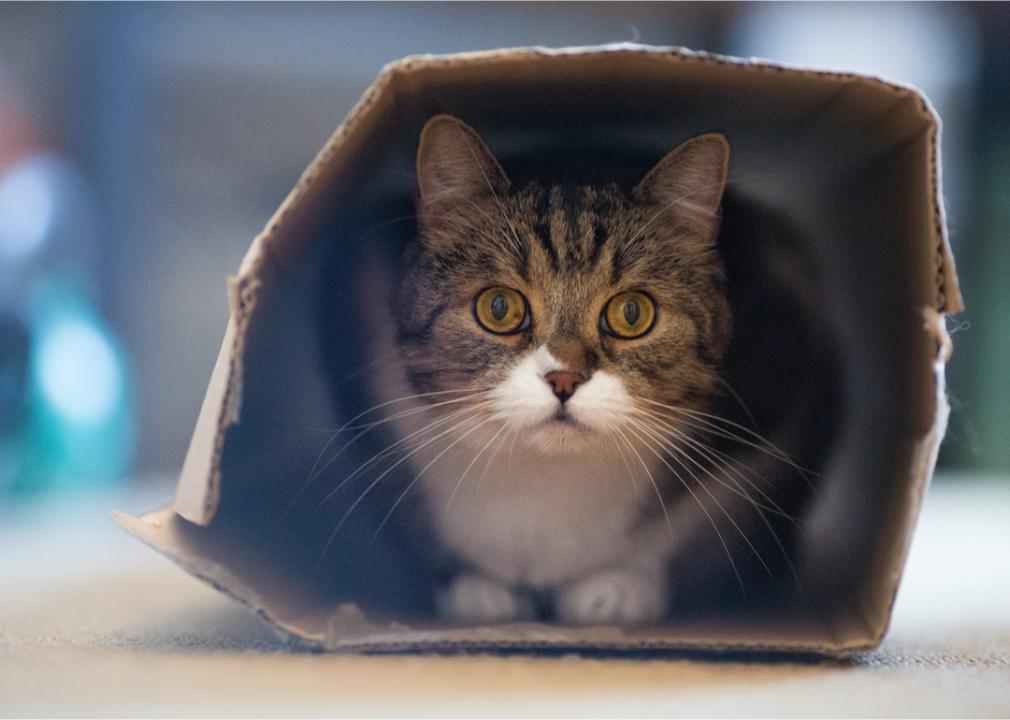
Nils Jacobi // Shutterstock
What’s my cat’s obsession with boxes all about?
Cats are ambush predators that sneak up quietly, hide, then pounce unexpectedly on their prey. They’re also adept at hiding in dark, closed spaces when larger predators stalk them. Therefore, tight hiding spaces like boxes are a comfort zone for both of a cat’s two main survival instincts—catching meals and avoiding becoming one.

sukran ilgin // Shutterstock
My cat seems to think he’s a god. Is that an ego thing?
Maybe not. Many cultures worshipped cats and even counted cat-like beings among their gods. This was at one point true for the Chinese, Egyptians, Norse, Polish, and Greek civilizations.
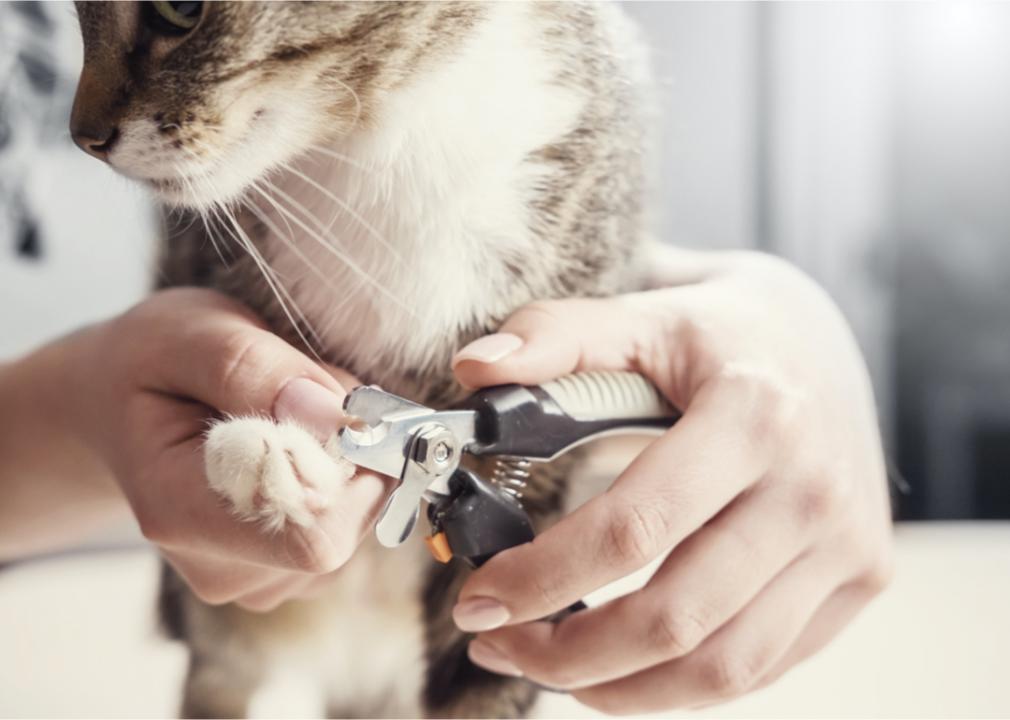
Denis Val // Shutterstock
Do I need to cut my cat’s nails?
Cats nails should be trimmed, but it’s not always a job for the DIY cat owner. The experience can be anxiety-inducing for the cat and scratch-inducing for the owner. Unless the cat will tolerate the uncomfortable intrusion, this might best be left to a vet or professional groomer, who will almost always pull it off faster, with less pain (for both parties), and with less likelihood of cutting too close to the quick.
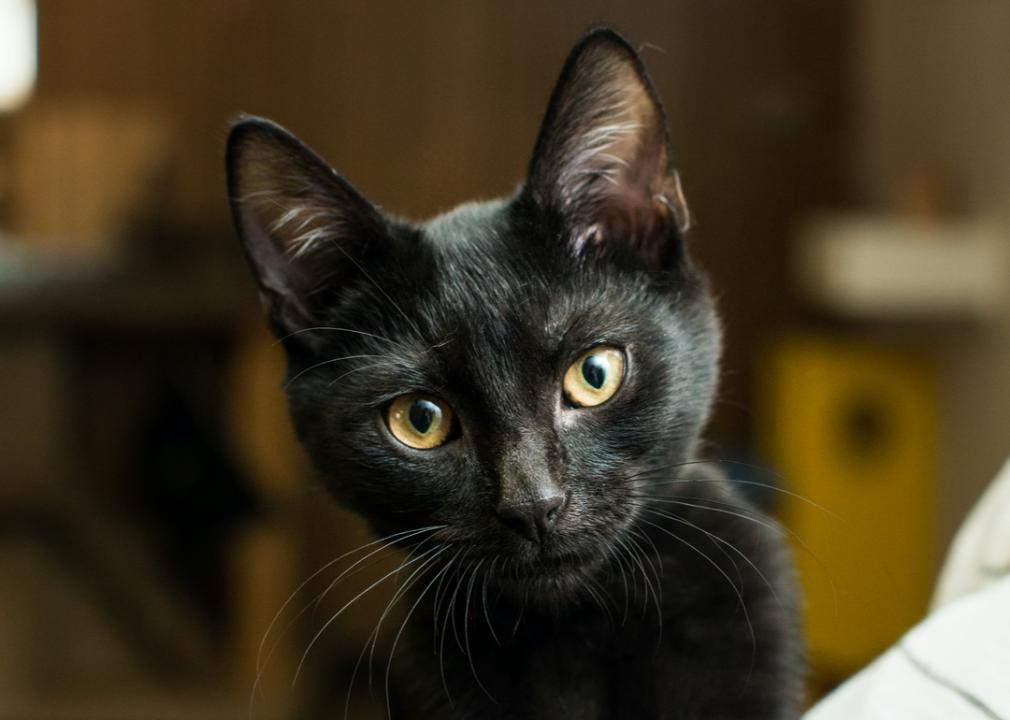
Casey Elise Christopher // Shutterstock
Why are black cats associated with bad luck?
Cats were long considered harbingers of doom for many cultures across the world—possibly because people were on the menu for large cats of all kinds before modern society took humans out of the food chain. Black cats—like black ravens and other black animals—got an especially bad rap in the Middle Ages when they were associated with supernatural evil, impending death, and bad luck. Today, the superstition is mostly relegated to Halloween folklore.
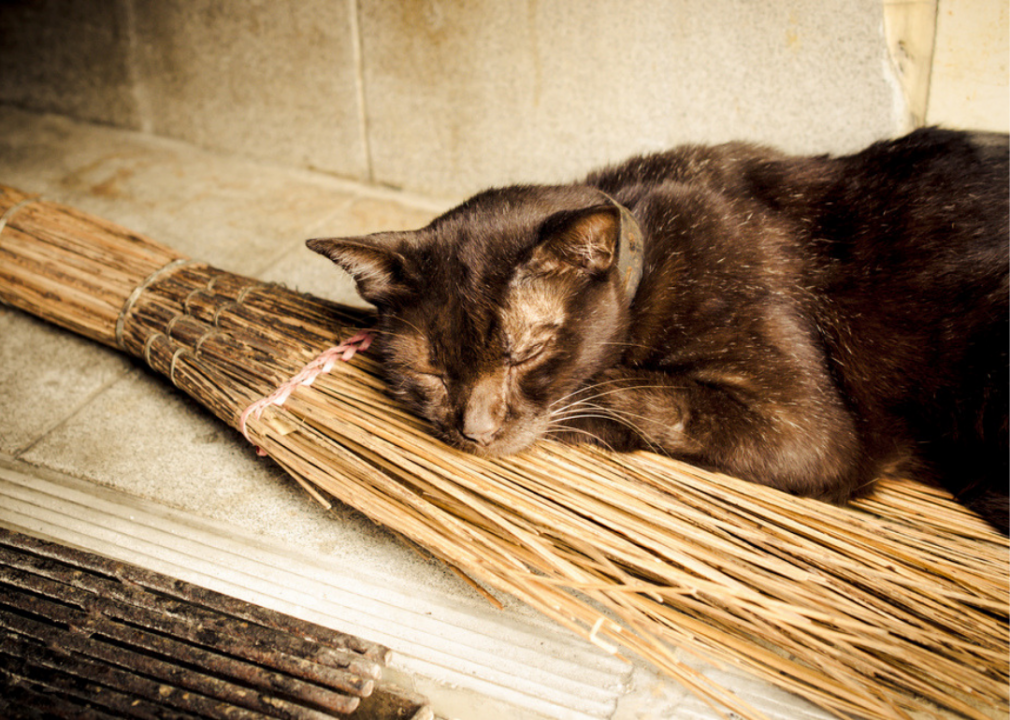
VICHAILAO // Shutterstock
Did people really once associate cats with witchcraft?
Superstition and religious paranoia were common drivers of the human psyche in the Middle Ages, and cats were widely believed to be witches in disguise, to work with witches, to empower witches, or to spy for witches. Cats, like people accused of witchcraft, were often rounded up, tortured, and killed—often by burning—particularly around the time of religious holidays like Lent.

Paramount Pictures // Getty Images
What’s up with the cat in the opening scene of ‘The Godfather’?
In the famous opening scene of “The Godfather,” Marlon Brando’s character Don Vito Corleone calmly strokes a cat while discussing a proposition to commit murder—but the feline wasn’t part of the script. Director Francis Ford Copolla found the cat—a stray wandering the studio lot—and handed it to Brando, a famous animal lover. The cat’s heavy purring, however, almost ruined the audio in one of the most famous scenes in movie history.
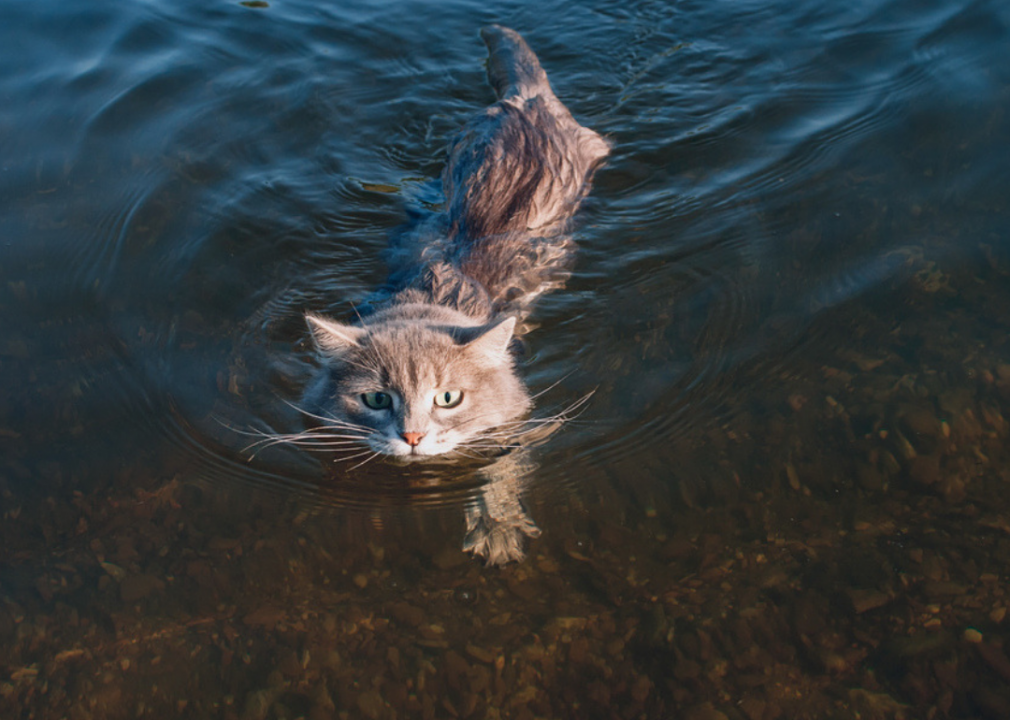
ALEKSEI SEMYKIN // Shutterstock
Isn’t there a breed of cat that loves water?
Virtually all cats avoid water because it makes their coats heavy and uncomfortable. The Maine coon is known for its odd resemblance to raccoons, but also for its peculiar affinity for water. The breed seems to be fascinated with water, seeking it out, reveling in it, and splashing around for hours.
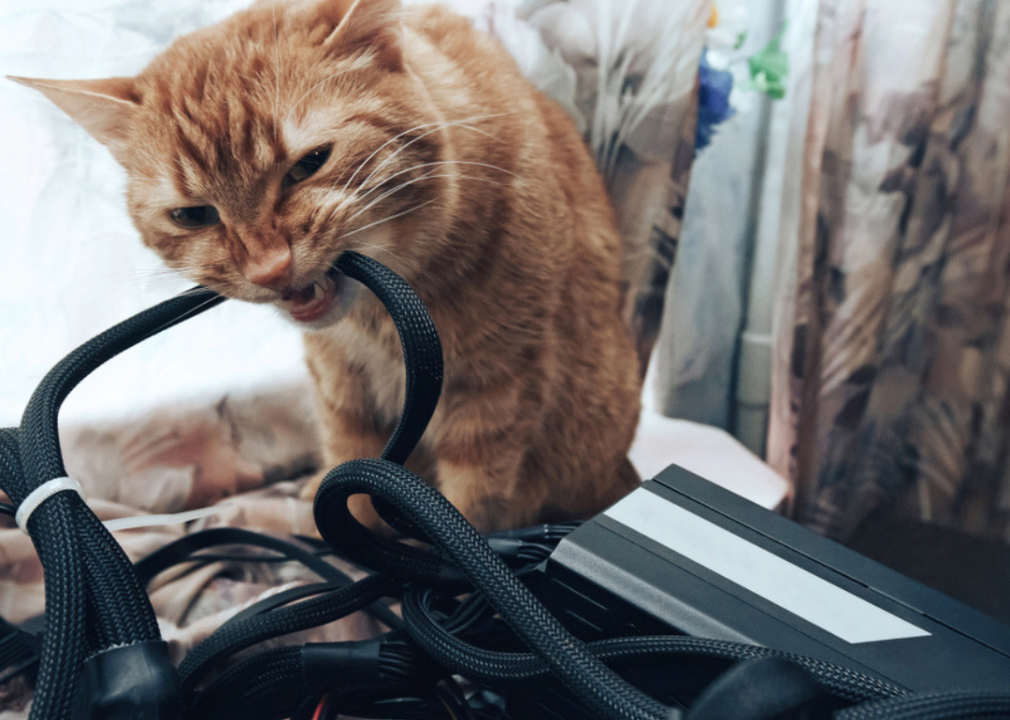
e-leet // Shutterstock
My cat won’t stop eating my wires. What should I do?
Cat owners know all too well that their feline friends often have an obsessive interest in wires. This means that any corded device—from phone chargers to video game controllers—can become chew toys if they’re left in plain sight. Since keeping all cords away at all times is simply not possible in the digital age, cat owners with gnawed-on cords should consider coating those cords with pungent sprays made for the express purpose of deterring wire-chewing pets.
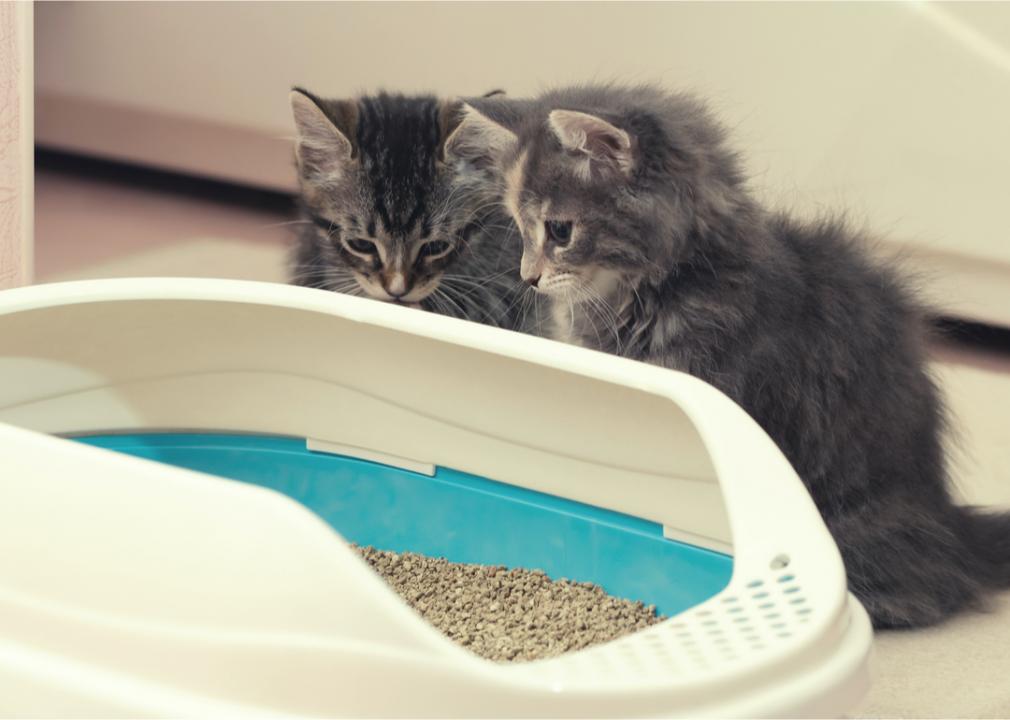
galsand // Shutterstock
Is it hard to house-train kittens?
It’s actually quite easy to get most kittens to use a litter box. Vets recommend placing them in a litter box shortly after feeding and waiting a while. It might take a little more effort with some kittens, and it can take several tries or more with cats that join a family when they’re older, but the process is much easier than housebreaking a dog.
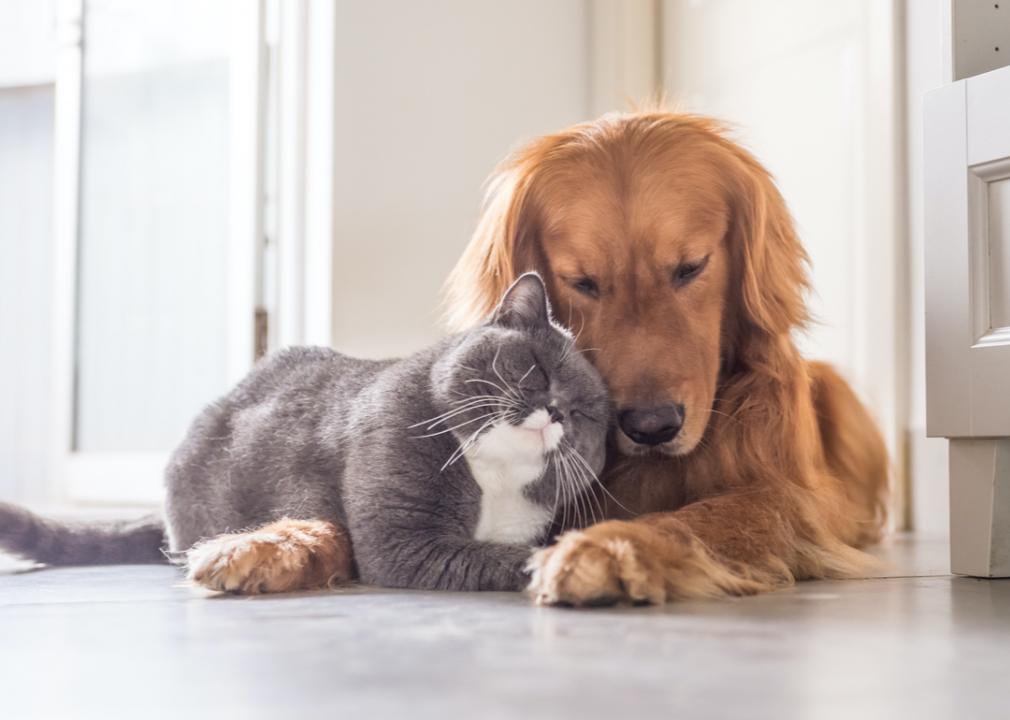
Chendongshan // Shutterstock
Can cats transmit diseases to my other loved ones?
Cats can and do pass diseases to children and other pets. Parasites are the biggest threat to people and viruses are the most common problem for other pets. The best remedy for both—and the several other transmission risks—is frequent visits to the vet, where parasites and viruses can be detected and mitigated.
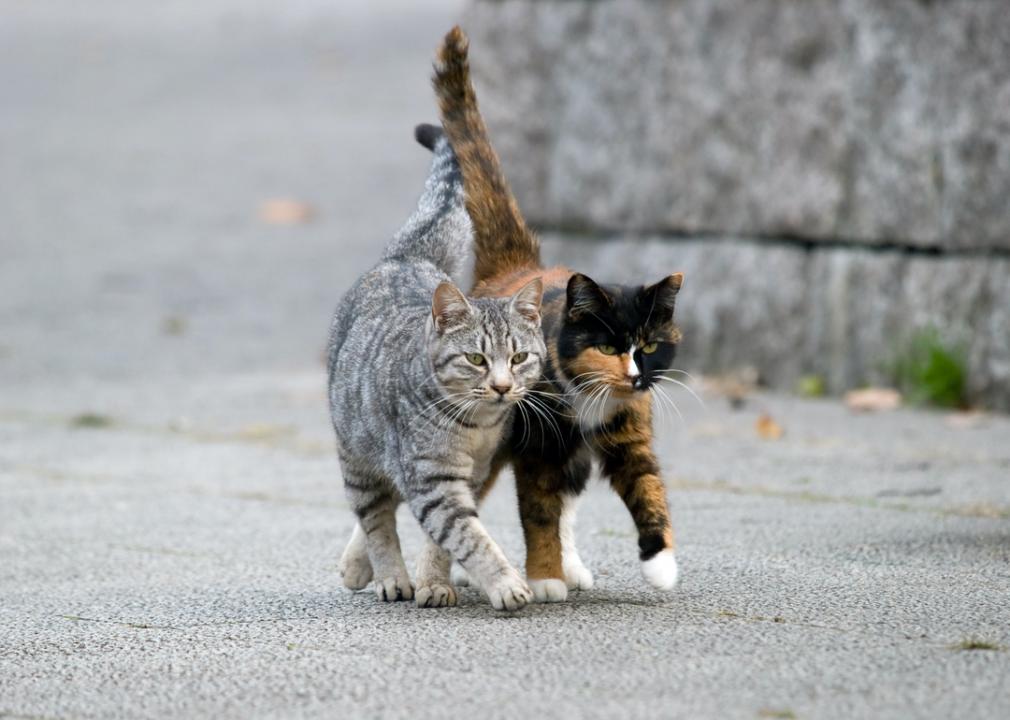
Seiji // Shutterstock
Do cats have gender titles?
Male cats are called toms—unless they’re neutered, then they’re called gibs. A female is called a molly or a queen. Father and mother cats are called sires and dams, respectively.
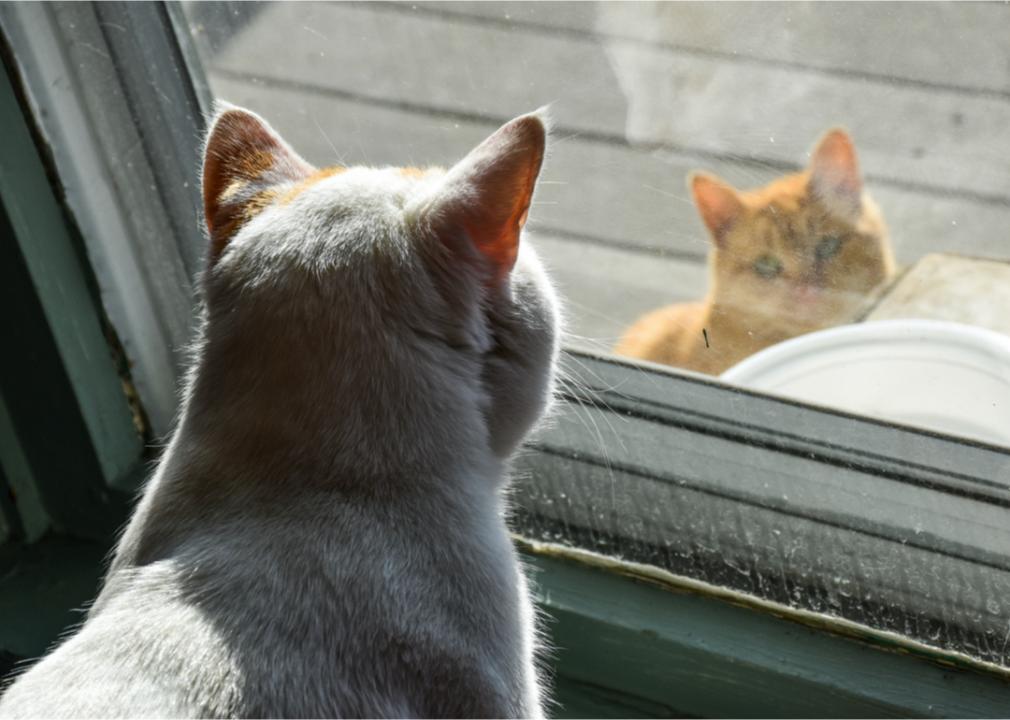
RacheeLynn // Shutterstock
Can I take in a stray?
Taming, domesticating, and housebreaking a feral cat—or even a kitten—is not a task to be taken lightly, but it’s certainly not impossible. The first step is a visit to the vet because feral cats are often wracked with parasites, but also to make sure it’s not a lost pet with an embedded chip. The vet can help with planning, but most experts recommend starting slow by introducing the new arrival to the house one small section at a time.
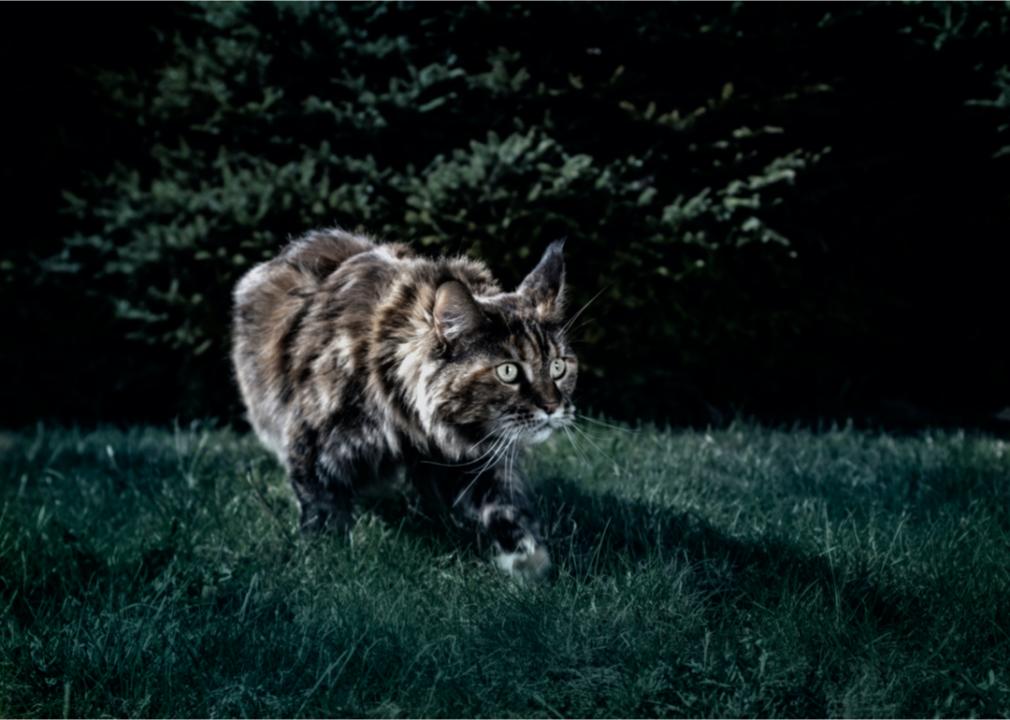
Konstantin Zaykov // Shutterstock
Can cats really see in the dark?
Yes, but it’s only dark if you’re human. Cats have between six and eight times as many cells in their eyes designed for enhancing night vision. That means they can see clearly in near-lightless environments that would appear almost completely dark to people.

Eugenia Terekhova // Shutterstock
Was the internet actually invented to showcase cats?
In 2010, a researcher estimated that there were 1.3 billion cat pictures online—today, that number is probably closer to 6.5 billion. In fact, studies have shown that as much as 15% of all web traffic is, in one way or another, related to cats.
Hi, I’m Jenny Dean, creator of Floppycats! Ever since my Aunt got the first Ragdoll cat in our family, I have loved the breed. Inspired by my childhood Ragdoll cat, Rags, I created Floppycats to connect, share and inspire other Ragdoll cat lovers around the world,






